
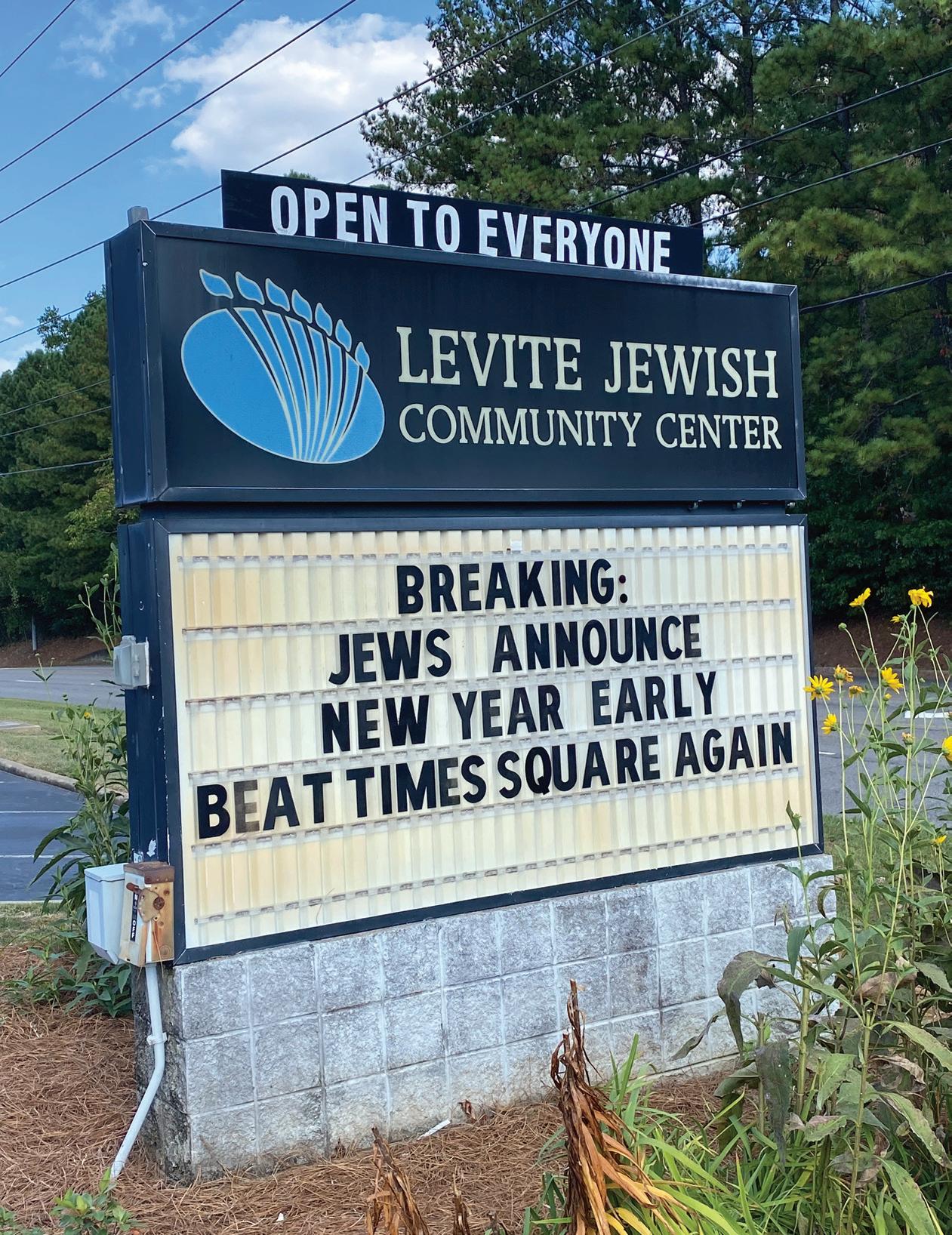











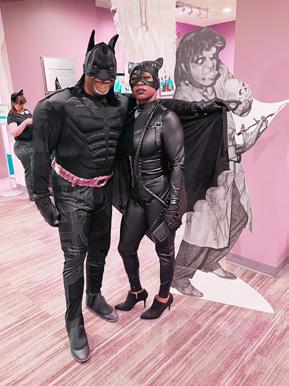

Friday, October 17

7pm-10pm | $45pp
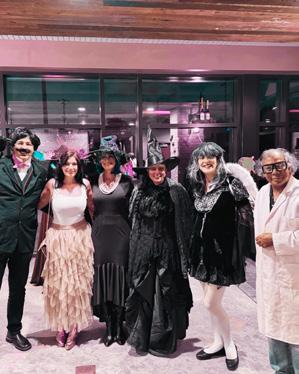
Ghoul-tastic Costume Contest with Prizes
Live Music from The Consortium of Genius
Hauntingly Good Bites from Top Local Restaurants
Sip on Wicked Wine & Bewitching Brews presented by presents



Publisher/Editor
Lawrence Brook editor@sjlmag.com
Associate Publisher/Advertising
Lee Green lee@sjlmag.com
Creative Director
Ginger Brook ginger@sjlmag.com
Social/Web
Emily Baldwein connect@sjlmag.com
Contributing Writers
Rivka Epstein, Belle Freitag, E. Walter Katz Columnist
Doug Brook brookwrite.com
Birmingham office: P.O. Box 130052, Birmingham, AL 35213
New Orleans office: 3747 West Esplanade Ave., 3rd Floor, Metairie, LA 70002
(205) 870-7889 • (504) 249-6875 (888) 613-YALL (9255)
ADVERTISING: Contact Lee Green, (205) 870-7889, lee@sjlmag.com
SUBSCRIPTIONS: Subscriptions for the print edition are $30 for one year, $48 for two years. Paid subscribers to our Substack site also receive the print edition.
Copyright 2025. All rights reserved. No part of this publication may be reproduced in whole or part without written permission from the publisher. Views expressed in SJL are those of the respective contributors and are not necessarily shared by the magazine or its staff. SJL makes no claims as to the Kashrut of its advertisers, and retains the right to refuse any advertisement.
Documenting this community, a community we are members of and active within, is our passion. We love what we do, and who we do it for.

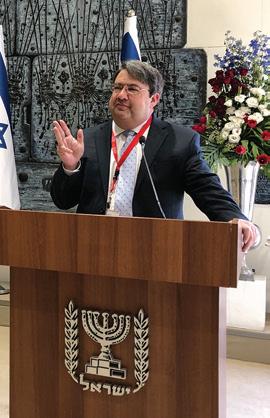
One major feature of anti-Israel activists is that there is no shortage of breathtakingly bad takes on the situation, charges against Israel that make one shake their head and wonder how someone could utter them with a straight face.
No matter how outrageous the charge, it will soon be outdone with an even bigger whopper — or something in direct contradiction to previous allegations. For example, the libelous charge that Israeli soldiers are using rape as a weapon of war on a massive scale in Gaza, as a way of deflecting attention from what actually happened on Oct. 7 when Hamas and hundreds of Gaza civilians invaded border communities in Israel, and used those tactics. The result? Believe all women, unless they are Israeli.
Those trying to sell the narrative of Israeli malfeasance apparently forgot how, about 15 years ago, some academics charged that Israelis were racist against Palestinians, and one major piece of evidence was how Israeli soldiers weren’t raping Palestinian women. How dare they not, the savages…
The newest entrant into the cluelessness sweepstakes comes from a very sad story, in Boulder, where the quiet Run For Their Lives has been held to remind people about the Israeli hostages in Gaza, as in so many cities around the world. On June 1, the event was attacked by a man who threw Molotov cocktails at the participants, injuring 13 and killing an 82-year-old woman.
Toward the end of August, the Boulder chapter said it would no longer publicize its events, keeping the locations secret and increasing security. It’s not just the June 1 attack — ever since, the marchers have been subjected to anti-Israel demonstrators, harassment, and language that we don’t feel comfortable printing, even with asterisking.
One of the most vocal has been Aaron Stone, who is running for city council in Boulder in the Nov. 4 election. Among his shenanigans was allegedly calling the local Run For Their Lives organizer a Nazi.

The QR code to our new Substack site. Subscribe today!

Southern Jewish Life is an independent Jewish periodical. Articles and columns do not necessarily reflect the views of any Jewish institutions, agencies or congregations in our region.

To subscribe, email subscribe@sjlmag.com


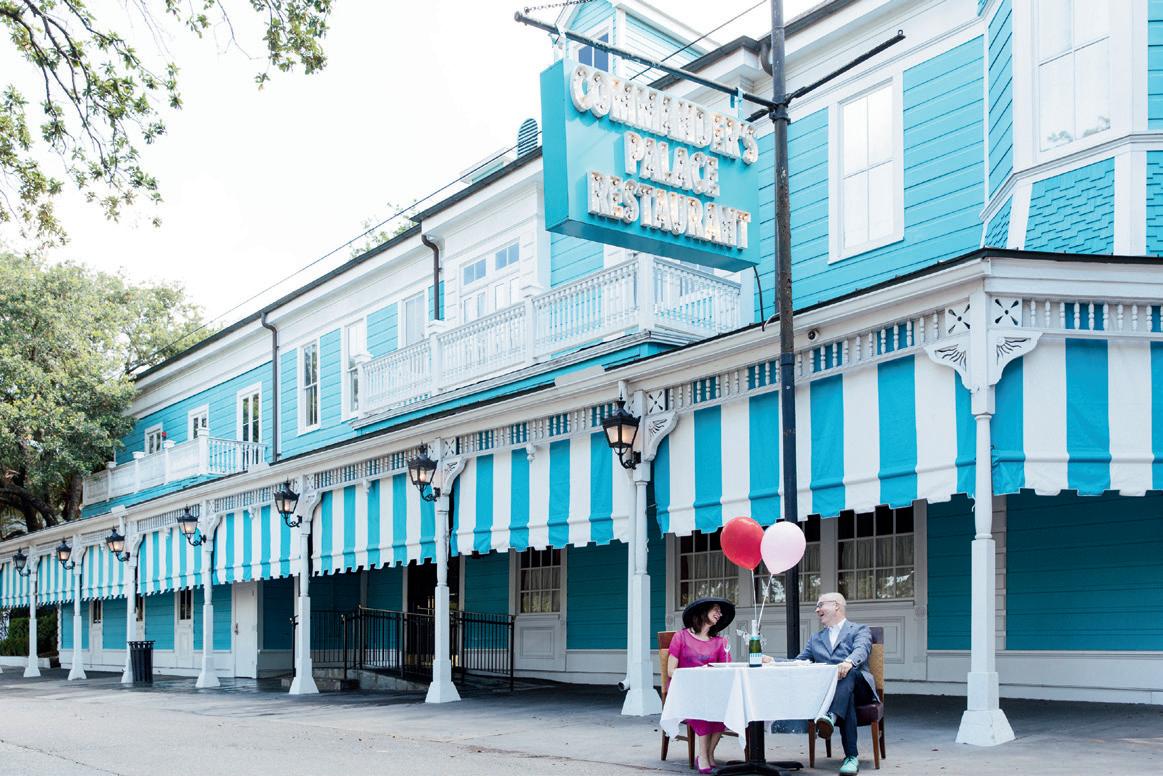
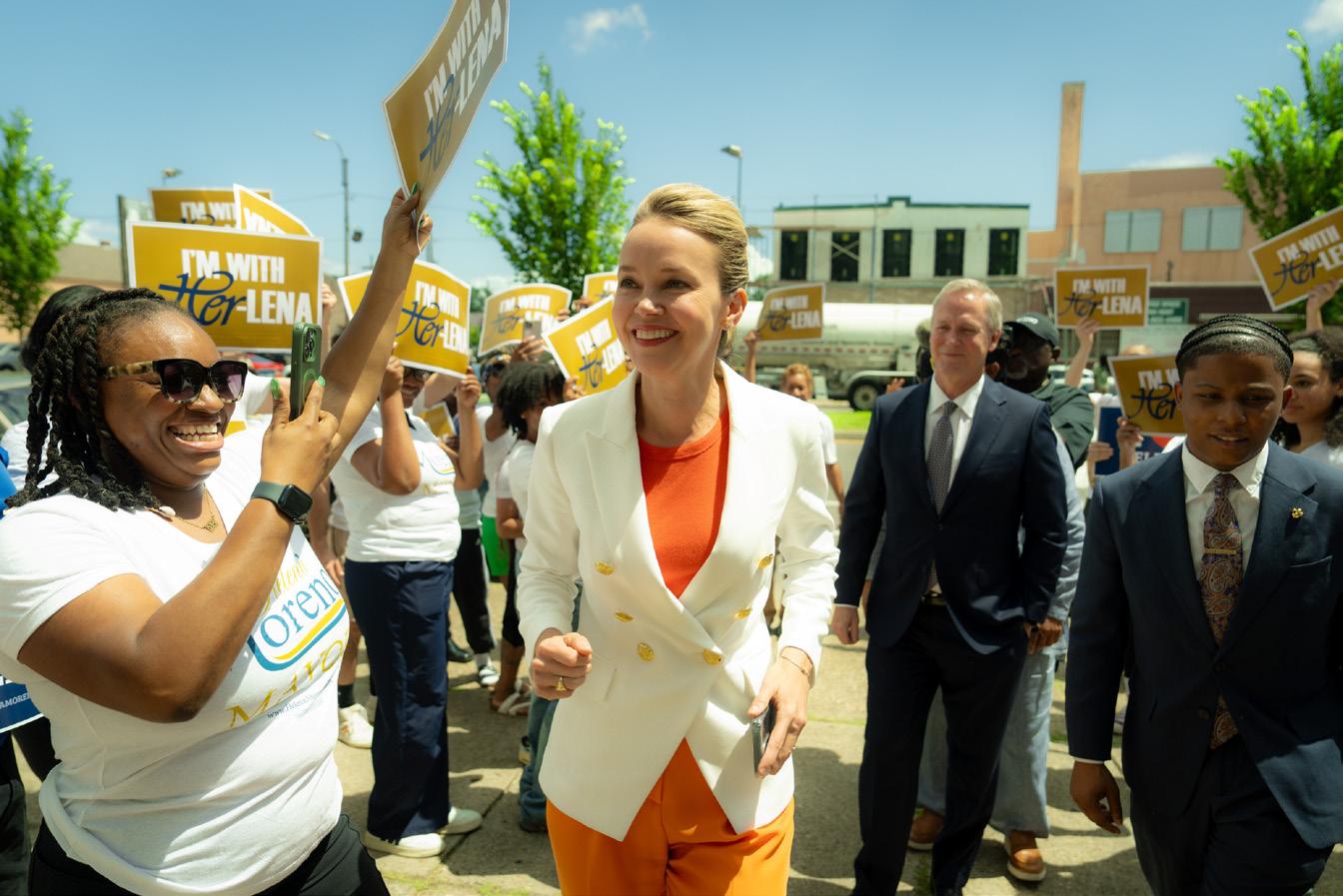





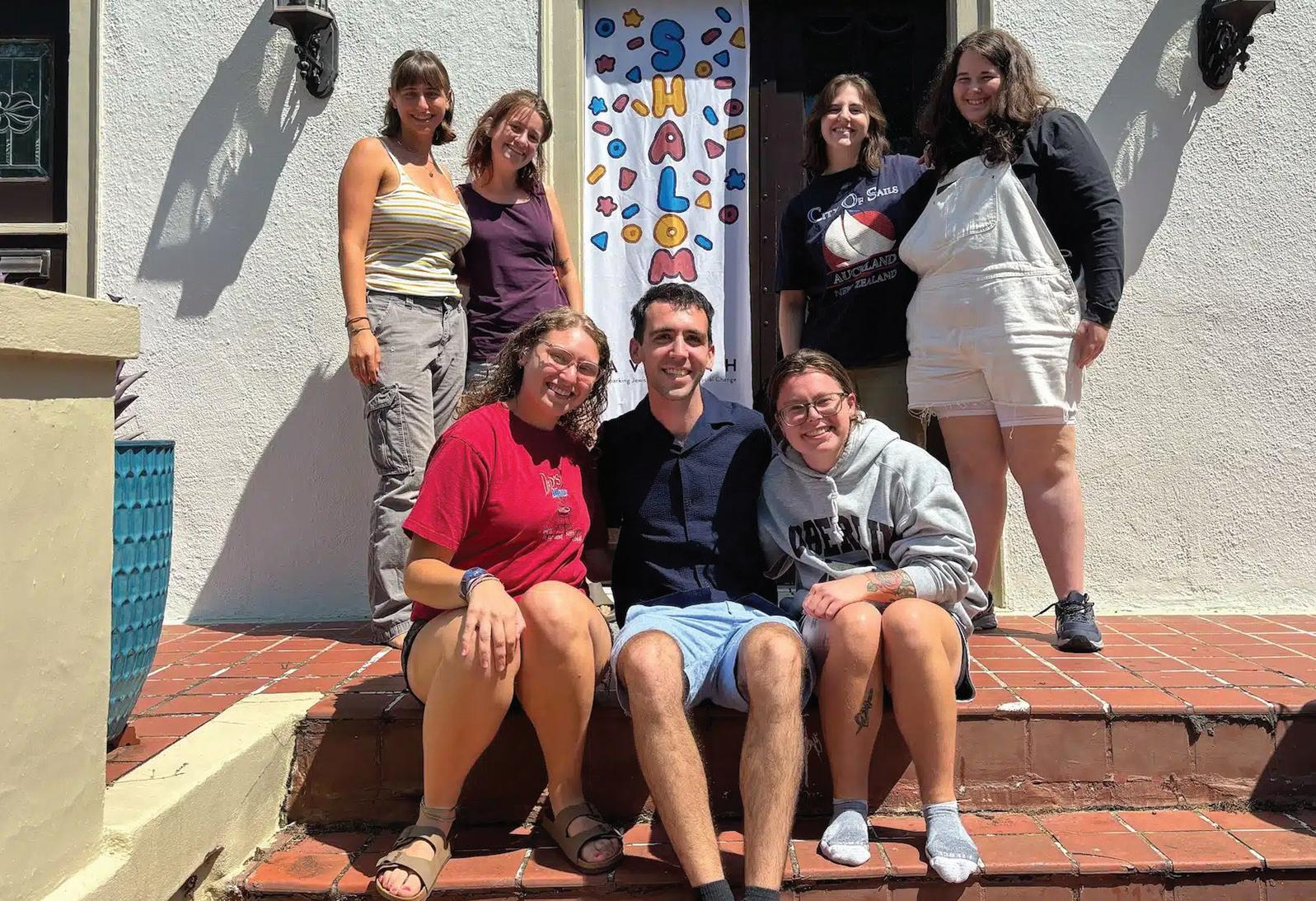
interesting bits & can’t miss events
The Avodah Service Corps announced the 48 members taking residence in its four cities across the U.S., including seven in New Orleans. The immersive service year program for ages 21 to 26 matches those who are passionate about social justice with leading nonprofits, giving members real-world experience while giving the organizations additional capacity to serve the community. Corps members live in a communal home and come from a wide range of backgrounds, from modern Orthodox to Reform to secular to “just Jewish.” This year’s participants come from 39 cities in 16 states, including Arkansas and Georgia.
The New Orleans group includes Adara, move-in specialist, UNITY of Greater New Orleans; Fey, tenant advocate, Southeast Louisiana Legal Services; Hannah, client and family assistance coordinator, The Promise of Justice Initiative; Lena, volunteer coordinator, Covenant House New Orleans; Maddie, program assistant, The Urban Conservancy; River, immigrant advocate, ISLA: Immigration Services and Legal Advocacy; Sophie, program coordinator, The First 72+.
November family-friendly event in numerous cities will kick off public phase of capital campaign
While the Henry S. Jacobs Camp in Utica is still holding prospective camper events around the region over the next couple months, there will be a much larger gathering of Jacobs alumni, families of current campers, and friends of the camp in at least 15 communities — at the same time.
On Nov. 16 at 11 a.m., the camp will have a family-friendly launch of its Capital Campaign, in collaboration with local synagogues and volunteers. While most of the locations will be in the camp’s traditional areas of the South, a couple will be in larger Jewish communities outside the region, where many alumni live.
Paige Mandelman, Capital Campaign manager, said the event “will be a major community and fundraising moment for Jacobs Camp,” with “compelling content and engaging activities to unite alumni, current families, and regional Jewish leaders in support of the campaign.”
The event will celebrate the camp’s impact on Southern Jewish identity, feature a festive camp-style lunch, and a talk by a local host or camp leader. There will also be camp-style activities for kids, including a song session, Israeli dancing, and arts and crafts.
Camp Director Anna Herman will address the groups by Zoom.
While this is the public kickoff for the campaign, the preliminary stages have raised over $12 million in commitments, and the results are already being enjoyed by campers. The new athletics center opened in the summer of 2024, and this summer, the Richard Orgel Bayit became the new home for the Solelim program, the oldest campers.
For next summer, cabins 1 to 12 are being renovated and updated for the next generation of Jacobs campers.
Locations for the kickoff include Gemiluth Chassodim in Alexandria, the Unified Jewish Congregation of Baton Rouge, Temple Emanu-El in Birmingham, B’nai Israel in Hattiesburg, Beth Israel in Jackson, the New Orleans Jewish Community Center, Beth El in Pensacola and B’nai Zion in Shreveport.
Additional gatherings will be in Atlanta, Denver, Houston, Little Rock, Memphis and Nashville. An event in Austin will be at 3 p.m.
Registration is already available at urj.tfaforms.net/1814.


The Museum of the Southern Jewish Experience in New Orleans will host Brian Costello for a program about his book, “Dry Goods, Cotton, and Cane: 250 Years of Jewish Life, Business, and Agriculture in Pointe Coupée Parish, Louisiana.” The free event will be online and in person on Oct. 30 at 6 p.m.
The book takes a close look at the Jewish history of an area of Southeast Louisiana that was once home to hundreds of Jewish families, whose presence dated from the 1760s. Jewish residents often married into the broader community, shared in its triumphs and trials, and played an essential role in shaping this culturally diverse region.
Pointe Coupee Parish is northwest of Baton Rouge, with just over 20,000 residents. New Roads is the parish seat. A landmark in Livonia was the Dreyfus Store, which Theodore Dreyfus took over from cousins in the 1880s. Successive generations ran the store until 1988, after which new owners transformed it into Joe’s Dreyfus Store Restaurant, which closed in 2013.
An 11th-generation Louisianan, Costello is one of the last native and most sought-after speakers of the Pointe Coupee Creole dialect. He is founding and current historian and genealogist of the Pointe Coupee Parish Library Historic Materials Collection, former editor of the Pointe Coupee Banner, and has participated in several nationally and internationally broadcast documentaries in his areas of work.
In Brookhaven, Miss., the Lincoln County Historical and Genealogical Society Museum is located in the former Temple B’nai Sholom, which closed in 2009. This summer, the society did a membership drive, and the incentive gift is two Christmas tree ornaments depicting local landmarks, one of which is the Temple. The image was drawn by Derek Covington Smith in 2023.

The Alabama Holocaust Education Center in Birmingham is taking part in a series of Zoom webinars, “What History Teaches: The Rise of Nazism.” Each session deals with an aspect of history exploring how democracy eroded and extremism took hold in 1930s Germany, and lessons that can be gleaned for today.
Other participating Holocaust museums and education centers include Los Angeles, Montreal, Illinois, Seattle and Buffalo.
The next session, “Women’s Loss of Rights During the Third Reich,” will be on Oct. 16 at 11 a.m., with Deborah Barton, associate professor of modern European history at the Université de Montréal. She will discuss the loss of women’s rights, particularly for Jewish, Black, and political opponents in 1930s Germany, and how Aryan women were able to negotiate roles for themselves.
On Oct. 29 at 11 a.m., the Nancy and David Wolf Holocaust and Humanities Center in Cincinnati will lead a program on “Universities, Education and the Role of Intellectuals.”
All sessions are free. Registration information is at ahecinfo.org.
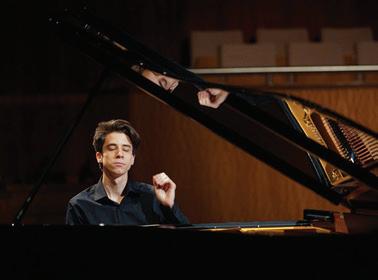
Russian/Israeli pianist Vitaly Starikov will be in Birmingham for the Birmingham Museum of Art’s 24th annual LaVona Rushton concert. The free event is on Oct. 16 at 7:30 p.m., with a 6:30 p.m. reception.
Starikov is touring the country as a result of winning the silver medal at the 2025 Van Cliburn International Piano Competition. Born into a family of musicians in Yekaterinburg, Russia, he enrolled in the Ural Musical School for Gifted Children at 7. He made his concerto debut at age 10 with the Ural State Russian Folk Orchestra, and his recital debut three years later. He has “repatriated” to Israel with his wife, daughter and dog.
At the Birmingham concert, he is scheduled to perform Chopin’s Etudes, op. 25; Liszt’s “Les jeux d’eaux a la Villa d’Este”; and Prokofiev’s Piano Sonata No. 7 in B-Flat Major, op. 83.
On April 18, he will return to the state for the Huntsville Chamber Music Guild’s joint recital with Aristo Sham at Trinity United Methodist Church.
Birmingham’s Levite Jewish Community Center will honor its history on Oct. 19 with the dedication of the Legacy Courtyard.
The new courtyard patio will open in honor of those who have been members of the LJCC for 40 years or more — from before the time “Levite” was added to the name. Over 100 Legacy members have already been identified.
The new patio will have outdoor furniture, shading and a new door connecting to the Hess Library. The reception will be from 2 to 4 p.m., with a brief dedication ceremony. All are welcome, registration is requested.
The courtyard is located behind the library, between the indoor pool building and the auditorium. The new patio ends a long period of disuse for the space.




Rena Branson is musician in residence at Beth-El
Birmingham’s Temple Beth-El will welcome Rena Branson as musician in residence for Simchat Torah, with programs centered around song circles. An alumna of the Rising Song Institute Residency, she served for three years as cantorial soloist at Congregation Leyv Ha-Ir in Philadelphia. She leads participatory concerts in communities across the country, promoting personal and collective healing, supporting people through their feelings of grief, rage and alienation into connection and hope.
She will lead a song circle skills workshop with the Beth-El davening team on Oct. 12 at 3 p.m., and there will be a mincha service and healing song circle at 5:30 p.m. The events are between the secular date of Oct. 7 and the Hebrew date of Simchat Torah, so the workshop will focus on building a bridge from heartbreak to joy, emphasizing the importance of both.
Branson will include her original works in the hakafot and dancing for Simchat Torah evening, Oct. 13 at 5:45 p.m., and especially for Hallel during the Oct. 14 service, starting at 9:30 a.m.
A composer and educator, she has recorded Chassidic melodies and two albums of original works.
The Cathy and Morris Bart Jewish Cultural Arts Series at the Uptown Jewish Community Center will continue on Oct. 18 with a concert, “Laura Nyro Live Tribute: A Great Jewish Songwriter.” Nyro, a Rock and Roll Hall of Fame member, was referred to by Joni Mitchell as her only female peer. She released several of her own albums, and many of her pieces became hits for other artists, including the 5th Dimension, Three Dog Night, Barbra Streisand and Peter, Paul and Mary.
Nyro, who died of ovarian cancer in 1997, was inducted into the Hall by Bette Midler.
The 7 p.m. concert will feature numerous New Orleans female musicians, including Ainsley Matic, Alizah, Hannah Kreiger-Benson, Katarina Boudreaux, Lilli Lewis, and Meryl Zimmerman.
The event is open to the community, but advance registration is required.
Rebecca Wolf kicked off a new author series with the central Louisiana Jewish community, and two more events are scheduled for October, coordinated by Shelley Kaplan.

On Sept. 9, Wolf appeared by Zoom at Gemiluth Chassodim in Alexandria to discuss the true story behind her book, “Alive and Beating,” about six varied individuals in Jerusalem. About 50 attended the event.
The series, which is also co-sponsored by Central Louisiana Jewish Federation and B’nai Israel in Alexandria, continues on Oct. 21 with Uri Kaufman, author of “American Intifada: Israel, the Gaza War and the New Antisemitism.” The 6 p.m. program will be at the Diamond Grill.
In the book, Kaufman explores the ideological shift that turned Israel from a liberal cause to a progressive target, through the assigning of “white privilege” to Israel and oppressed “people of color” to the Palestinians, and how that framework causes those progressives to shun a nation that largely shares their values to supporting those who oppose them.
Kaufman is also author of “Eighteen Days in October: The Yom Kippur War and How It Created the Modern Middle East.”
On Oct. 28, Mark Patinkin will discuss “The Holy Land at War,” 6 p.m. at Gemiluth Chassodim. Patinkin has been a writer at the Providence Journal for 49 years, and is a finalist for the Pulitzer Prize in international reporting. The 2024 book chronicles his personal journey through Israel, the territories and Gaza, capturing stories on both sides of the conflict.
Both authors will be in person, and copies of their books will be available.
There will be a kickoff dinner for a New Orleans Jewish community mission to Israel, Nov. 11 at 7 p.m. The mission is planned for June 8 to 18. Details about the informational session will be announced shortly.
Chabad of Mobile announced the successful completion of its online campaign to raise $120,000 the week of Aug. 17.
The Beth Israel Sisterhood in Jackson is planning a women’s retreat cruise, on the Carnival Valor, sailing from New Orleans to Cozumel, Dec. 4 to 8.
Hadassah New Orleans will have a Woman of Valor brunch honoring Betty Moore on Nov. 2 at 11:30 a.m. Location guven upon registration. Tickets range from $54 to $270.
Rabbi David Gerber of Gates of Prayer in Metairie introduced the “Gates of Chutzpah,” and to bring clarity, will lead “Finding Your Voice: A Jewish Guide to Speaking Up with Clarity and Conviction.” The six-week class will be on Wednesdays at 7 p.m., starting Oct. 22. The class will focus on the history and context of Israel, and how it is rooted in sacred Jewish values, giving confidence to counter misinformation and become an advocate. All are welcome, no previous knowledge is required, and a Zoom option is available on request. Register through the Gates of Prayer office.
There will be a Jewish War Veterans Shabbat on Oct. 16 at 6 p.m. at Beth Israel in Metairie. Veterans, patrons and active-duty members are encouraged to wear their uniforms or JWV service caps.
The final event for the 175th anniversary year at Gates of Prayer in Metairie will be A Taste of Our Tradition, Dec. 6 at 6 p.m. The evening is inspired by the rich traditions of the Alsace-Lorraine region. There will be a specially curated menu of French and German-inspired cuisine, an open bar featuring regional wines, craft brews and signature cocktails, and entertainment from Flow Tribe. Tickets will be available on Oct. 16.
The Birmingham Jewish Federation’s Women’s Philanthropy group will have a Shalom Havana journey to Cuba, Feb. 25 to March 1. The trip will include a visit to the historic Jewish Quarter, religious sites, the Jewish cemetery and Holocaust memorial outside Havana, and Shabbat with the local community. Registration and payment are due by Nov. 21.
Gates of Prayer in Metairie will screen “Blind Spot: An Eye-Opening Film About Campus Anti-semitism,” documenting the phenomenon before and after October 7. The 6:30 p.m. screening on Oct. 15 will be followed by a
When it comes to senior living, you want more than a place to live — you need a place to thrive. That’s why at Brookdale University Park, we help take care of the challenges of aging for you.
Amenities:
• Variety of floor plans
• Social events and activities
• Walking paths
• On-site putting green
• Pet-friendly accommodations
• Close to medical and shopping centers
To learn how we can help you connect with new friends and interests, call (205) 506-0214 today.
Brookdale University Park Independent Living | Assisted Living




Applications are now open for two summer camp scholarships in the region — one for firsttime campers in the Deep South, and the other for campers from rural Louisiana. Both are administered by the Jewish Endowment Foundation of Louisiana, and applications are available on the foundation’s website.
The Goldring Jewish Summer Camp Experience offers a one-time grant of up to $1,500 for first-time campers attending a non-profit Jewish sleepaway camp. Eligible campers are in grades 1 through 9, and live in Alabama, Mississippi, Louisiana, Arkansas or the Florida panhandle.
The incentive program was initiated by JEF in 1999 and has been funded by the Goldring Family Foundation since 2001. Over 1,800 children have taken part.
The grant is not based on need, and a family need not be a member of a synagogue to qualify.
The RoseMary and Saul Brooks Fund for Jewish Youth Engagement helps campers outside the Louisiana metropolitan areas who are physically distanced from a Jewish community to attend a non-profit Jewish sleepaway camp.

The fund provides an incentive grant of up to $750, and eligible campers may apply each year they are eligible. The grant amount varies by the number of approved applicants and the available funds.
First-time campers who apply for the Goldring grant are not eligible, but may be eligible after the first summer.
To qualify, students must identify as Jewish
and have at least one Jewish parent. They must also reside in Louisiana, but outside the New Orleans, Baton Rouge and Shreveport areas. Orleans, Jefferson, East Baton Rouge, West Baton Rouge, Bossier and Caddo Parishes are not eligible. The program is for students who will enter grades 1 to 12 after camp.
In 1995, RoseMary Brooks of Baton Rouge created a Charitable Remainder Trust at JEF. Part of the plan was to provide income for her grandchildren for travel to Israel as well as a permanent legacy for other Jewish youths, enabling them to experience Jewish camp and travel to Israel. Since then, her grandchildren divided the annual income of the assets and used that money to travel to Israel.
After her youngest grandchild reached the age of 18, the fund was converted to a Designated Fund held at JEF, at which time, in accordance with Brooks’ wishes, the money will be used to send other Jewish youths to Jewish summer camp or to Israel.
Jewish Children’s Regional Service, the New Orleans-based agency that distributes needbased summer camp scholarships in a seven-state region, will announce its application process shortly.
The Birmingham Jewish Foundation also announced that starting in 2026, non-need based grants of $1,000 will be available for campers in the area who are entering their second and third summers at Jewish overnight camp. More details will be released soon.
The next Jewish Learning Institute course at Chabad houses nationally will be “The Kabballah of Meaning,” Jewish wisdom for finding the purpose that connects all parts of life.
The six-session course will address Judaism’s approach toward meaning in life, exploring some of life’s most fundamental questions. No previous Judaic knowledge or study is needed.
The first class deals with the search for meaning and purpose, discussing four fundamental human qualities that provide lasting fulfillment.

Other classes include whether to invent meaning when none is apparent, making ordinary mundane life more significant, the texture and spirituality of Jewish time, envisioning life where every event leads to greater purpose, and Judaism’s understanding of the inherent worth of every person.
Chabad of Baton Rouge will offer the class on Mondays at 11 a.m. at the main library at Goodwood, or on Zoom at 6 p.m. The course will run
from Oct. 27 to Dec. 1. Registration is $98, with a 10 percent discount for returning students or couples.
At Chabad Uptown in New Orleans, the class will be on Wednesdays at 7 p.m., from Oct. 29 to Dec. 3. It is offered in person and online, and registration is $89. There is a 10 percent discount for couples or for returning students.
In Metairie, the class will meet on Tuesdays at 10:30 a.m. or 7:30 p.m., Nov. 4 to Dec. 9, online and in person. There will be a free standalone class on Nov. 4, with either brunch or dinner served. Registration is $89, with a 20 percent discount for couples or returning students.
As of press time, details for Birmingham, Pensacola or other possible venues in the region had not been announced.
The course satisfies continuing education requirements for physicians, healthcare professionals, psychologists, social workers, LMFTs, and LMHC/LPCs in most states.
New Orleans JCC, B’ham Jewish Federation stay with familiar faces
Rebecca Friedman, who took over as interim director of the New Orleans Jewish Community Center on March 31, has been named the permanent director.
Robyn Nowak, president of the JCC, made the announcement on behalf of the JCC board on Sept. 22.
Friedman assumed the interim role after former CEO Michael Rawl stepped down for personal reasons. She had just become JCC president on Feb. 2, and agreed to a one year interim commitment, as Nowak became president of the board.
“Since stepping into the interim role in late March, Rebecca has helped guide the organization through the leadership transition with calm, compassion, and skilled management, earning the trust and respect of our staff and members,” Nowak said.
She added that during Friedman’s over 10 years on the board, including the brief stint as president, she “developed a thorough understanding of our JCC and its role in this community. She understands the special place it has held in the hearts of community members for generations and is committed to building upon that legacy for the future.”
A Metairie native, Friedman graduated from Yale and worked for McKinsey and Company in professional development and communications for over a decade before returning to New Orleans, where she has been a freelance journalist. She has also been active with the New Orleans Museum of Art and the New Orleans chapter of Les Dames d’Escoffier.
As the Iron Curtain fell from the Soviet Bloc, in 1990, Florina Newcomb was one of the first New Americans to be resettled by the Birmingham Jewish Federation and its constituent agencies. Now, she is leading the Federation.
On Aug. 15, the Federation announced that the term “interim” had been removed from before her title of CEO. She had been serving as interim CEO since March, when Danny Cohn left to become the CEO of the Jewish Federation of St. Louis.
Under recent community streamlining, she is CEO over the Federation and the Birmingham Jewish Foundation.
Newcomb attended the N.E. Miles Jewish Day School and graduated from Birmingham-Southern College. She joined the Federation in 2015 and has served in numerous roles, including the Annual Campaign, Women’s



Dine In — Take Out — Catering Mon-Thu 10am-7pm • Fri & Sun 10am-3pm (Closed Saturday) 3519 Severn, Metairie (504) 888-2010 www.koshercajun.com Outside the New Orleans area? We will ship your order to you!



We can’t ensure this Rosh HaShanah will usher in a peaceful year. But with your support, Magen David Adom can continue to be a source of light, hope, and lifesaving care to all Israelis — no matter what 5786 brings.
Support Israel’s lifesavers at afmda.org/give or 866.632.2763.






Philanthropy, PJ Library, the Israel-World Jewry Bureau and community
She has participated in many national and international Federation events, including General Assemblies, the Jewish Federations of North America’s Executive Accelerator program, the Young Leadership trip to Israel, and the October 7 Solidarity March in Washington. In 2023 she went on a JFNA mission to Moldova, to see the work being done with refugees from Ukraine. It was also an opportunity for her to visit where
In the announcement, Federation President Sheryl Kimerling and Foundation President Alan Weintraub said “Florina brings incredible experience, expertise and passion to this role, and we feel extremely grateful to have her serving the Federation and Foundation community as CEO.”
Newcomb said she is “deeply honored” to assume the role, and “I am endlessly grateful for the most supportive Jewish community and for the
She cited the “incredible work of my predecessors,” Richard and Sally Friedman, and Danny Cohn, “whose vision, dedication and leadership have made a lasting impact on our community. I look forward to building on their legacy and expanding our programs to strengthen Jewish life

Jewish history. Over the past 25 years, the Institute has helped dozens of
The tour curriculum is designed for a wide range of audiences, from teen groups to Jewish non-profits to solo travelers. The guides include pre-trip preparation to on-the-ground programming and educational resources, along with reflective activities for after the journey. Individuals and groups can choose their own trip design based on the curriculum.
Each city’s curriculum includes a travel guide to the city, including ISJL-recommended historic sites, hotels and service project partners.
The first round of guides includes Birmingham, Montgomery, Selma and Jackson. Additional cities that will be released in the future include Atlanta, Memphis and New Orleans.
“We are passionate about preserving and sharing the vibrant stories of Southern Jewish communities,” said Ana Berman, ISJL Programs and Education coordinator. “Our goal is to help groups curate the Southern Jewish journey of a lifetime through meaningful and memorable experiences that honor both Jewish heritage and the broader historical context of the American South.”
The curriculum is $100 per city, and is available on the ISJL website. Tour consultations are in 30 or 60-minute Zoom sessions, or a package of three one-hour sessions.
Before the Institute spun off from the first incarnation of the Museum of the Jewish Experience, Jewish Road Trip travel guides along various routes in the Deep South were published.








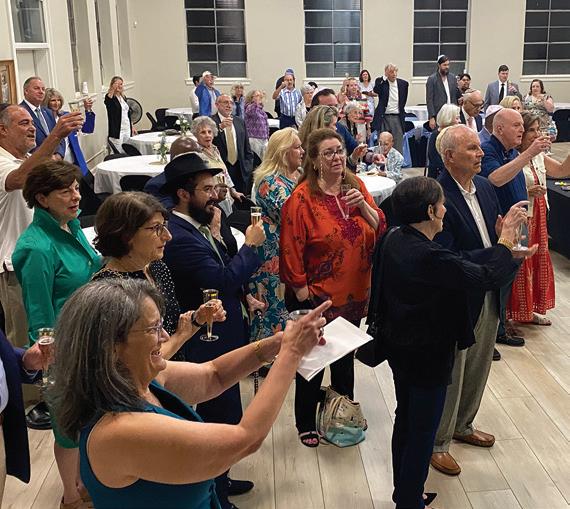

B’nai Israel anniversary includes dedicating sanctuary in honor of the Rosenbaum family
After some initial uncertainty over the timing, B’nai Israel in Pensacola held its 125th anniversary celebration on July 24, as originally planned.
A cornerstone of the event was the renaming of the congregation’s sanctuary in honor of the Rosenbaum family, particularly brothers Gene and Joe Rosenbaum. Gene died on July 27, 2024, and the unveiling ceremony for his headstone was planned for July 25, the day after the anniversary event.


But then, Joe Rosenbaum died on July 11. The family went ahead and held the unveiling on July 14, the day after Joe’s funeral. The next day, it was announced that the anniversary celebration and dedication would proceed as planned.
The celebration began with a dinner catered by Sheila Mizrachi, with a sushi table, deli station and traditional dishes. The wife of Rabbi Yehoshua Mizrachi, “Chef Sheila” is a graduate of the Culinary Institute of America and was the first female sous chef at the famous Peabody Hotel in Orlando.
As everyone filed into what is now the Rosenbaum Family Sanctuary, the Rosenbaums occupied their traditional seats in the third row.
The first presentation of the evening came from Rabbi Mendel Danow from Chabad of Pensacola. He noted that when B’nai Israel was formed 125 years ago, the Jewish community in Jerusalem was “very poor,” with “not a lot of resources, it was a barren land.”
The chief rabbi of Jerusalem, Rabbi Shmuel Salant, appealed to Jewish communities around the world to help support the Jewish community in Jerusalem, which grew from 5,000 to 30,000 during his 38 years as chief rabbi. Danow said there was a small American community where tzedakah boxes were distributed, filled, collected and counted, and in 1897 $500 was sent to Jerusalem.
While that may not have been a huge amount, “it was nothing to laugh about,” he said, given the small size of the community. That community was Pensacola, and the accompanying letter was from Alex Lischkoff, written in Yiddish, on letterhead with a Palafox address. Lischkoff was the founding president of B’nai Israel.
Danow presented the original letter to the congregation, showing “Jewish life in 1897 in Pensacola supporting Jewish life” in Israel.
Danow explained that his uncle works for an auction house in Israel and came across the letter, and when he saw Pensacola referenced, knew he has a nephew there and contacted him.
He said that the Rebbe said there “is no such thing as a small Jew,” and people “say we’re just a little town. It’s Pensacola. There’s no resources, what can we do about it.”
But taking the words of the rebbe, Danow reminded that “we may be physically not a lot, but the spirit is strong, and we come here tonight celebrating it.”
Marci Goodman, who chaired the event, gave a slideshow history of the congregation, talking about different families that have played significant roles in the past 125 years.
While many might assume that Florida’s Jewish history centers around South Florida, the community actually began in Pensacola, with the first Jews arriving in 1763 with the British takeover of the area, and with some New Orleans Jews anticipating trouble as that area went from French to Spanish rule, as Jews were not welcome in Spanish territories, going back to the 1492 expulsion.
Many early arrivals eventually wound up in Mobile, and a cohesive community in Pensacola did not develop, as the Spanish returned to the area in 1781. Jewish migration to Pensacola resumed in the 1820s when Florida became a U.S. territory, and in 1822 Virginia Myers was the first Jewish child born in Florida. The community developed in the 1850s with immigration from central Europe.
After the Civil War, Pensacola grew rapidly, and in 1869 the first Jewish cemetery was established, followed by the first B’nai B’rith lodge. In 1876, Temple Beth El became the state’s first Jewish congregation — decades after the first congregations in Alabama, Mississippi and Louisiana. Beth El, comprised mainly of German-speaking immigrants, joined the Reform movement in 1889.
In the late 1800s, Jews from Eastern Europe began arriving in Pensacola. In 1899, a handful of Orthodox Jews began discussing an alternative
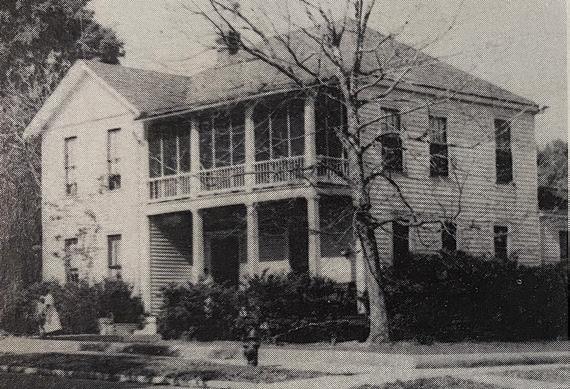
to the Reform practice at Beth El. On June 28, 1899, 11 men established B’nai Israel, the state’s sixth Jewish congregation, and held the first services at Beth El’s building on Chase Street, which had recently been rebuilt following a fire. Pensacola became the first community in Florida with two synagogues.
After a brief time meeting at Beth El, B’nai Israel then met upstairs at the Oddfellows Hall at Baylen and Belmont, which congregants later discovered was also a meeting-place for the local Ku Klux Klan, as children poking around on the first floor found the Klan robes in a closet.
The Ladies Relief Society was founded in 1920, then added the Ladies Auxiliary in 1928. They merged in 1941, and in 1956 became affiliated with Women’s League, the Conservative movement’s Sisterhood organization. A Young Judea youth group was established.
As increased immigration from Eastern Europe brought more traditional Jews to the area, plans were made to establish a building. In 1923, a house at 400 North Barcelona was purchased. The first floor was the sanc-


From the moment they came into the world, we do our best, trying to get it right. So what happens when something goes wrong?
That’s when we have to get it right.
The Center for Cancer and Blood Disorders at Manning Family Children’s has the biggest cancer fighting team in the Gulf South and the most advanced therapies that can be found anywhere - all right here, in our own backyard. So they can get right back to being kids again. manningchildrens.org/cancer







tuary, with mechitzah, and the second floor was the rabbi’s residence.
In the basement, they built a mikvah so people could follow the laws of family purity.
“Jewish education was paramount in the minds of these foundational families and has always been a centerpiece of B’nai Israel’s mission,” Mizrachi said. B’nai Israel also served as a Jewish community center.

In the early 1940s, plans began to replace the building with something that looked like a synagogue. The Silberman family left a large bequest to the congregation for a new building, and ground was broken at the current site on Dec. 2, 1953. The dedication was held in September 1954, and one year later, the congregation affiliated with the Conservative movement. In 2014 the congregation wrote a new Torah scroll.
Rabbi Mizrachi arrived in the summer of 2024. He said that of the 19 rabbis who have served there, 17 were Orthodox — even after the congregation became Conservative.
Mizrachi said “we’ve embarked on an exciting new era for B’nai Israel,” and named several upcoming initiatives. He said LinkedIn recently named Pensacola as one of 25 up and coming cities, and “more and more young families” attending services as the post-October 7 and overall national trend toward more traditional spirituality among the younger generation manifests itself.
He announced, “We’re working to start an affordable daycare program, and then the autumn of 2026 we are planning the launch of an innovative Hebrew day school utilizing the most advanced digital resources available, a unique dual education model designed to prepare Pensacola’s Jewish youth for the challenges and rewards of modern Jewish life.”
B’nai Israel has also been at the forefront of Israel advocacy. “We will continue to stand unapologetically for the inalienable right of the Jewish people to dwell securely in our ancestral homeland, from the Mediterranean Sea to the Jordan River, and from the Golan to Eilat.” A 2026 Israel trip is being planned.
The congregation also recently began outreach activities, such as Cooking with Chef Sheila, a culinary program for adults with disabilities, through bi-weekly cooking activities.
The congregation also supports the Jewish community in Uganda, and has been working on Jewish unity in Pensacola among the three congregations.
Mizrachi concluded, “We are all the spiritual heirs of the founding pillars of our synagogue, and looking out at this room tonight, we can look up and say to them, those pure and sacred souls which surely gaze down upon us tonight from above, that we are keeping faith with their vision and that we continue to walk in the path of Torah and mitzvot that they so carefully prepared for us so many years ago. May we all merit to honor

Anders was diagnosed with an rare genetic condition that was affecting his immune health and significantly impacting his overall development. His doctors determined his best treatment option was a bone marrow transplant, and luckily Anders found his match and received his transplant. Now Anders is reaching new developmental milestones and is starting to get back to being a normal kid.

Be the match that saves a child’s life. Join the National Marrow Donor Program Registry at nmdp.org/join.
their memories by adhering to the values which guided their lives and by becoming part of our common Jewish destiny, part of the Jewish future that is B’nai Israel synagogue.”
Mizrachi spoke of his first time in the sanctuary, “struck by its intense spirituality” as he noticed seatbacks and armrests worn by decades of use. “I continue to feel the presence of God in this special place and I hope you do as well. So it is very appropriate that we commemorate the 125th anniversary gala of B’nai Israel synagogue in this sanctuary.”
Just before doing the official dedication, Goodman explained why the sanctuary was being named for the Rosenbaum family. “The family has been involved and continues to be involved with this synagogue for well over 100 years. This family has produced numerous presidents, board of directors, sisterhood and men’s club members while also being active participants in Pensacola and national community organizations. Since 1909, a mere 10 years since this congregation was formed this family has been with the congregation through bad and good times has been an integral part of the synagogue’s continued success now at 125 years
and counting.”
Goodman said “we felt it was only appropriate to honor, thank and continue to remember this family and their contributions not only to the synagogue and the Jewish community, but to the world as a whole, by naming the place that they knew and loved so well for them and their descendants.”
Pensacola native Jay Kaiman, who is president of the Bernie Marcus Foundation in Atlanta, apologized for appearing via Zoom instead of in person, noting it was very important for him to participate in an event honoring “a family whose presence has shaped B’nai Israel and the wider Pensacola community for generations.”
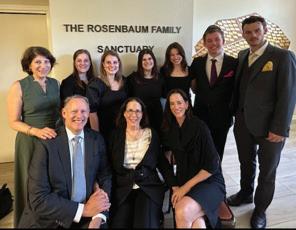
He said “the Rosenbaum family represents the very best of the American Jewish experience.” In Pensacola, it is “a name that represents faith, humility, community and, in my opinion, enduring love.”
“Dedicating this sanctuary is not simply about assigning a name to a space,” but “acknowledging the lives, the values and the quiet acts of service that give the sanctuary meaning.”
The Rosenbaums came to Pensacola from
what is now Belarus for safety, but Kaiman said “they didn’t come here to escape something from behind, they came to do something ahead.” He started by speaking of Jack and Leah Rosenbaum, saying he remembered Jack as “a man of principle and persistence.”
In 1935, he began Southern Hide, Wool and Junk Co., a scrap and salvage yard which grew into six companies. Jack “was a proud and active citizen of Pensacola going far beyond our Jewish community. One of the most celebrated civic
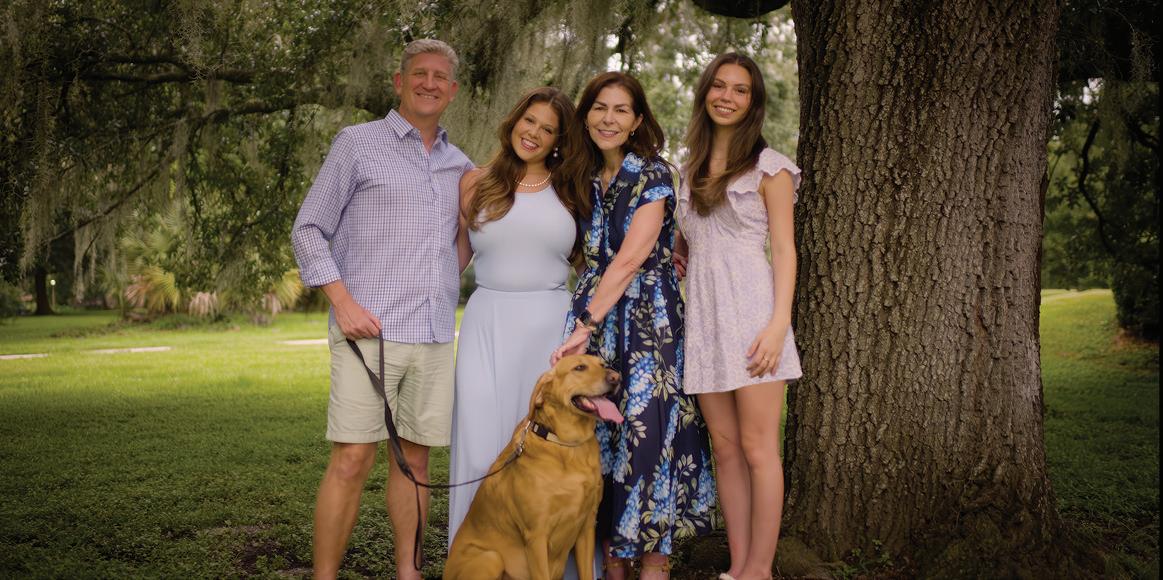

honors, Jack was actually the king of the Fiesta of Five Flags, to reflect not just popularity but the deep respect he earned as a contributor to the life and spirit of the city.”
By his side was Leah, who gave “strength and tireless energy on behalf of Hadassah and the synagogue” and “took joy in helping shape the civic life of Pensacola.”
There are well-known photos of her standing “with Yitzhak Rabin, with Moshe Dayan, with Chaim Herzog, when they visited Pensacola in their uniforms, to raise money for Israel and to probably work with the Naval Air base.”
They raised their sons, Gene and Joe, with principles of faith and service. After attending the University of Florida, both brothers went into military service before returning to Pensacola.
Kaiman said he worked with Gene when he returned to Pensacola as United Way campaign director. Gene was campaign chairman, and Kaiman spent a year with him “as he dressed up as Captain United, in tights and a cape, getting the helicopter from Baptist hospital, and we dropped him at every workplace around town so he could ask the people for support.”
Joe convinced him to take on his role at the Pensacola Jewish Federation, and he recalled working with him on Super Sunday during their “Bellsouth days.”
“Together, Gene and Joe lived out the values they inherited from their parents,” Kaiman said, adding that the legacy goes forward through their children and grandchildren, as he recalled their Bar and Bat Mitzvah ceremonies.
He added, “The Rosenbaum family makes sure B’nai Israel endures, not through one dramatic gesture but through decades of consistent care.”
Faye Rosenbaum, wife of Joe, said “Joe and I were deeply touched the day Lori and Barry (Ripps) came over to our house and shared the plan to name the sanctuary… I immediately thought of my brother-in-law Gene, and how proud he would be at this honor.”
She said “this sanctuary has been the heart of so many moments in our lives, celebrations, milestones and memories, shared with dear friends and family. To have our family name connected to such a meaningful and sacred space is truly humbling.
“Joe and Gene never sought accolades for their support as young boys they were taught the importance of giving tzedakah, not for recognition but because it was the right thing to do.”
She concluded, “I know Joe and Gene would be deeply honored, not because their names are on the wall, but because values live on in this community. May this sanctuary continue to be a place of prayer, learning and connection for generations to come.”
After the program, the evening concluded with pastries and a champagne toast.


BROOK
66-B Church Street, Crestline (205) 871-4583 Monday-Friday
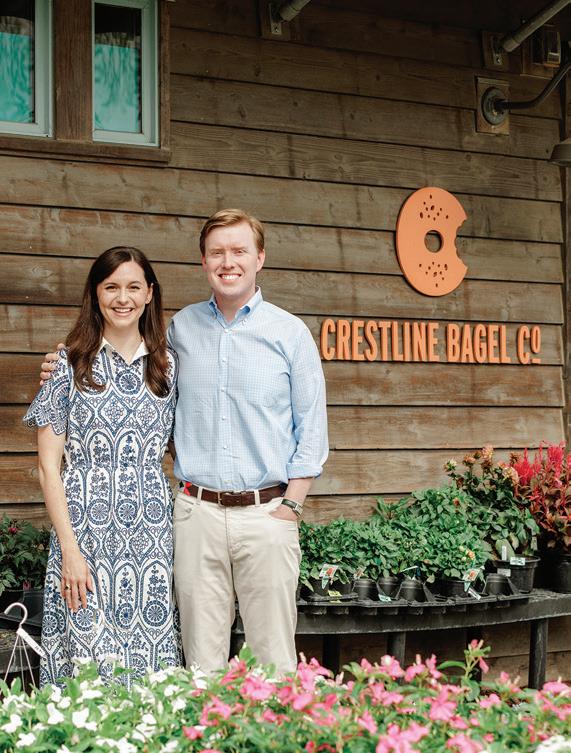

Tucked away in the heart of Mountain Brook’s Crestline Vil lage, Crestline Bagel has been serving authentic food and supporting our community for over 20 years. We invite you to explore our deli cious handmade bagels, breads, spreads and specialty sandwiches at our Mtn. Brook, Cahaba Heights or Downtown location.

As students headed off to campuses around the country, and with campus antisemitism still a major topic of concern, JewBelong greeted the students with a series of its well-known pink billboards with messages to raise awareness and fight antisemitism.
The national organization placed billboards at the Universities of Alabama, Florida and Mississippi, Louisiana State, Clemson and Florida State.
The non-profit group promotes “joyous Judaism,” especially to those in the Jewish community who feel isolated or marginalized, and also fights antisemitism, with increasing intensity in the past two years. They have placed over 1,000 billboards and run message trucks in some communities.
“It’s a terrifying time to be a Jewish college student. Jewish students do not feel safe and are up against some of the worst antisemitism of our lifetime,” says JewBelong co-founder Archie Gottesman. “The Jewish community is only 2 percent of the entire country, so we need to work extra hard to break through to the wider American public. Schools need to do better. Jewish students deserve to be safe on campus.”
In general, Southern schools have been far less affected by antisemitic incidents, and have become a magnet for many Jewish families concerned about campus antisemitism elsewhere in the country.
In Tuscaloosa, “Being Jewish shouldn’t require campus security” was placed at McFarland and Hargrove, and at Bridge Avenue at 27th Street. “You don’t need to be a Jew to protect Jews” was placed at 15th Street and Hackberry Lane.
A press release tailored to the Alabama billboards mentioned the January 2023 controversy over “Ye is Right” graffiti in 20 locations on campus. It also conflated the campus with the University of Alabama at Birmingham in mentioning an April 2024 controversy “where Students for Justice in Palestine organizers characterized the October 7 Hamasled attack as ‘natural and justified’.” While UAB has seen more anti-Israel activity, there have been occasional incidents at Alabama, generally drawing a larger crowd of counter-protesters.
At the University of Mississippi, Clemson and Florida, “Standing against antisemitism is standing with America” billboards were included. Last year, that billboard had been placed in New Orleans, and one of the billboards was vandalized into a pro-Palestinian message.
Other billboards in the campaign include “You don’t need to be a Jew to protect Jews,” “Jewish students don’t need your pity, just your spine,” and “Chocolate hummus on an onion bagel isn’t the hate crime we’re currently worried about.”
In Baton Rouge, billboards were placed on Interstate 10, one at Bazaar Avenue, and two at Christian Street, one facing each direction. At Mississippi, the billboards are at Highway 76 and University Avenue on each side, and on Mississippi 7 and Abbeville.




Polina Schlafer Wheeler, REALTOR
“Putting You First since 2009”
Crye-Leike - Oxford 1310 University Ave. Oxford MS 38655
Direct 662.401.4632
Office 662.234.5344 polinawrealtor@gmail.com https://oxford.crye-leike.com/
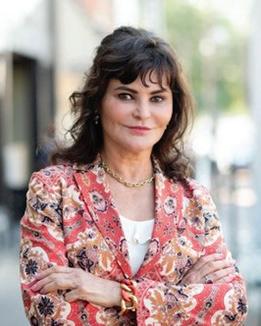



Richard and Sally Friedman describe the “split screen” of resilience and trauma in Israel, while the West gets maybe “5 percent” of the actual story
When Richard and Sally Friedman traveled to Israel this month, though he has been there over 50 times and she has been there over 25, it was their first visit since Oct. 7. Sally said their purpose was to “listen and learn from as many Israelis as I could… and hopefully explain things to my little corner of the world.”
What started as a small lunch briefing for a few turned into a program for over 60 people at the Levite Jewish Community Center on Sept. 25, where the retired long-time directors of the Birmingham Jewish Federation and Birmingham Jewish Foundation gave perspectives that are completely missing in most coverage of current events in Israel.

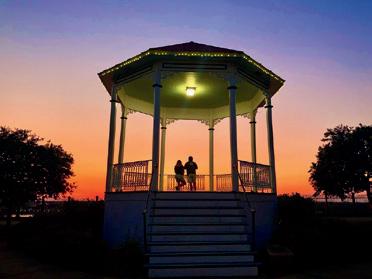


Sally noted that “the whole country is suffering from PTSD,” as everyone knows someone who was murdered on Oct. 7, or knows someone related to an Oct. 7 victim, or a hostage, or a soldier who has been killed in action. And yet, Israeli existence is a “split screen,” because even with that, “Israelis are out there having a great time… they will not give in. To not live their lives joyfully is giving in to terrorism.”
Richard said that for those relying on the Western media, “at best you have 5 percent of the information.”
One common question he has fielded is whether he felt safe going to Israel, and he said he felt safe “every single minute,” and only on their last night did they have to run to a shelter in their hotel, where “everybody knew what to do.” Echoing the split screen metaphor, he said “there is a normalcy, though under the surface, things are not normal.”
While the Western media give the impression that Israel is incredibly divided, Richard said it is a “very serious time in the destiny of their country and in their own lives.” There are two consensus items: The release of the hostages from Gaza, and that Hamas must be dismantled and unable to ever threaten Israel again.
The country’s divide, Richard said, is “what order and what the priority should be.” He added that they did not meet a single person who opposed the war, because they realize what is at stake. Even with the division in opinion over Prime Minister Benjamin Netanyahu — which he added isn’t as it is being portrayed outside Israel — there was a broad consensus among those they met regarding the goals of the war.
Especially since the Second Intifada in the early 2000s, Israeli society has changed politically, so the divide isn’t between right and left, it’s more between the right and the center.
The Friedmans spent time with a friend in Birmingham’s sister city, Rosh Ha’Ayin, who they met 40 years ago when she was 12 and came to Birmingham as part of the city’s mandolin orchestra. She told the Friedmans that the emphasis had to be the hostages, because part of the fabric of Israeli life is “the social compact between you and the government,” that the military would do everything to bring you home. Then, she said, deal with Hamas later.

But her sister in law insisted, equally passionately, that getting rid of Hamas is the priority, because otherwise, there will be more hostages in the future.
As they returned from the visit with the sister in law, the Friedmans’ friend noted the difference in opinion, then encapsulated the current dilemma in Israel by adding, “but I don’t know if I am right.”
They also ran into an old friend who has taken a scraggly appearance — his son is serving in Gaza, and he vowed not to cut his hair or shave until his son returned. He related that his son told him that if he were captured in Gaza, he did not want negotiations on his behalf, he did not want a single terrorist to be freed for him.
They met Remo Salman El-Hozayel, a Bedouin Muslim who is credited with saving over 200 lives at the Nova Festival on October 7. For months, Sally said, he was a “zombie” because of the trauma, and has been undergoing therapy. She noted he had befriended one of the girls he rescued, becoming her sounding board, but he had a setback when she committed suicide from the trauma.
They visited Sderot, which was hard-hit on Oct. 7. Terrorists commandeered the police building and used it as a sniper position, until Israeli forces flattened the building. Richard said that when they went to a lookout post that overlooks Gaza, his guide told him that any booms he would hear “are our booms. You are safe because we are in control.” That was the day Israel was taking out a couple high rise buildings in Gaza City that Hamas was using as sniper positions.
They also visited the north, where Israeli towns were emptied for a year and a half due to Hezbollah missile attacks. Residents have returned to heavily damaged neighborhoods, and damaged homes overrun with animals.
Sally noted that funds from the Federation’s Israel-World Jewry Bureau is providing funds, and the “support has been vital for them to get back on their feet.”
They also visited the soldiers’ building at Sheba Hospital, showing the sign noting the names of the senior staff. The head nurse for “Returning to Life Rehabilitation” is Muslim.
They met Luis Har, one of only eight hostages that have been rescued by Israel. He spent 129 days in captivity, and is undergoing physical therapy and PTSD treatment at Sheba. But, Sally noted, when he is done with his appointments, he goes across the hall to volunteer with helping wounded soldiers.
Sally said “I am more awed than I have ever been about the Israeli people,” and their “unbelievable selflessness and incredible resilience.”
Richard urged everyone to visit Israel, partly because Israelis need to see support from the rest of the world, but also to “understand it from the inside… it is much more nuanced and complicated than it is portrayed in the Western media.”
He said the Israeli desire is “comfort us and love us. Don’t criticize and editorialize” based on inaccurate and incomplete information. “Understand that we are in an impossible, intractable, existential predicament. And you may not like some of the things we have to do to survive.”
He said Israel is finally speaking the Middle
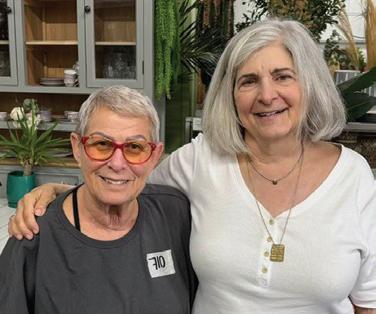
three days after the invasion,
the stress of Oct. 7 and the evacuation that followed.
East’s language, where respect comes through “force and power.” Rather than emphasizing being loved by the West, Israel feels they have to “exert our force and power if we want to live here as a Jewish state in the Middle East.” Supporters of Israel need to “be prepared to understand it and advocate for it.”



BY BEVERLY KATZ, Landscape Designer



Having seen things from the inside in several parts of city government, Holly Friedman believes that people should expect more from government, and that interacting with city government needs to be streamlined and simplified.
Friedman is running in the Oct. 11 election for New Orleans City Council in District A, hoping to succeed Joe Giarrusso, who is not running for re-election after eight years in the seat. She served as his constituent services director, and managed his 2017 campaign.
Currently, she is director of the Open Source Intelligence and Forensic Team, working in the justice system with Orleans Parish District Attorney Jason Williams. She is also working on a Master’s of public administration at Tulane, focusing on economic development and infrastructure.
Friedman is a past president of the Isidore Newman School Parents Association Club, and is a past board member for Temple Sinai. She currently served on the Anti-Defamation League South Central Region’s Education and Civil Rights committees, and was a member of the 2017 Katz-Phillips Leadership Development class of the Jewish Federation of Greater New Orleans.
She said the Katz-Phillips experience was “life changing.” The class formed a tight bond “that happened quickly,” and she has watched many classmates “growing in the community as leaders.”
The class trip to Israel “opens your eyes in ways people don’t expect.”
She reflected that “just being part of that program, learning to be good leaders in the Jewish community, how to be good leaders outside the Jewish community, it was an invaluable program.”
Friedman said she “never felt a greater calling or feeling of doing good than when I was helping people navigate government.” She wants to see a “transparent smart city,” with an information dashboard for every city department. She created such a dashboard for Giarrusso, saying that using technology can make the city work smarter instead of harder.
“Taking that on a citywide scale can be life changing for the city of New Orleans,” she said. And it isn’t just for the citizens — it benefits city workers who are often frustrated by inefficient processes. “Instead of playing whack-a-mole, you are using tech to work smarter.”
For example, she said, there are streetlights out throughout the city. Department workers go to the oldest complaint and fix it, then to the next oldest. Friedman said, “why not do a five-block radius? That’s where data can help the workers.”
Catering everything from office lunches to B’nai Mitzvah to private dinners in your home Holiday Catering • Shabbat Dinners to Go
Annunciation Street, Uptown New Orleans
Tel:(504) 354-9878 www.bodega-nola.com

Those who live in New Orleans “love New Orleans, we really do. But we just don’t expect a lot of basic city services to come our way,” making daily life more frustrating. “How do we keep our communities here? Providing city services giving them a quality of life.”
Her time at the DA’s office gave her “a new context in the criminal justice area.” With her range of first-hand experiences, she will be able to call on people from different parts of city government.
She also saw the judicial system from the inside as minute clerk for Judge Keva Landrum in the Parish District Criminal Court.
She wants to “form a better and stronger relationship” with the New Orleans Police Department. “Historically, being good partners was aways the mantra, but not necessarily how it worked in real life.” Having a real working relationship “is invaluable” at the city government level.
At the DA’s office, her team has a mindset of working with NOPD, both in analyzing data through OSINT and in creating “heat maps” of crime by talking with communities and partnering with law enforcement, and dealing with neglected structures that add to community blight.
One example of that was coordinating the shutdown of the long-problematic London Lodge in Hollygrove.
For her goal of turning New Orleans into a transparent smart city, she
has studied other cities that have undergone similar processes, and found “the cost is low.”
She said this is not making more work for people. “I’m trying to find solutions,” and “it’ll make the departments happier too when they are working more efficiently.”
She also wants to eliminate impediments to economic growth in the city. “In New Orleans, we are not encouraging or helping small business owners. We tend to say no a lot, permit denied or waiting for a permit.”
For those growing up in the city, “I want a New Orleans they can come back to and get a job, and right now it doesn’t feel that way.” She asked why people would invest when streets are shut down and crime is a large factor. ‘We definitely need to work on the infrastructure issues and the crime issue.”
The people in New Orleans routinely demonstrate that they want to support local development and small business. Her college-age daughters’ friends “were amazed they didn’t know the menu at Chipotle. We don’t go there because we have Felipe’s.”
That is New Orleans, she asserted. “We want
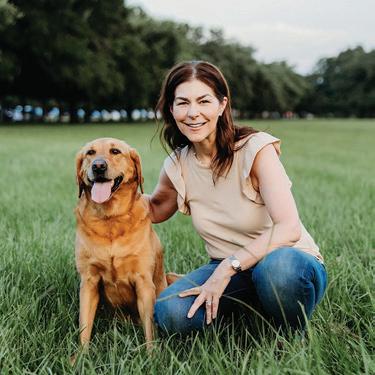
to support the small business owners, the mom and pop shops, but we need city government to do that as well.”
Friedman said this is an important election, with a new mayor and the council working with whoever that will be. “I’m hopeful,” she said. “It’s time to start working together, stop fighting and get things done.”
Ashley Lewis and the Fred Smith Group employ an aggressive marketing plan unlike any other Realtors in the area. We believe in marketing beyond the sign, and go the extra mile to help our clients. Our goal is to sell your home or property for the most amount of money in the least amount of time.


Jewish Endowment Foundation of Louisiana and the New Orleans Jewish Community Center will hold a B’nai Tzedek philanthropy program, to guide teens to become the future leaders of Jewish philanthropy.
The program will be for teens in grades 9 to 12, discussing social impact and philanthropic engagement. A dinner will be served, and teens can earn two service hours.
The program will be on Nov. 6 at 6 p.m. at the Goldring/Woldenberg Jewish Community Campus in Metairie, and on Nov. 11 at 6 p.m. at the Uptown JCC.



To the Families of New Orleans
Our decision to join the professionals at Lake Lawn Metairie allows us to continue our mission to provide families the highest caliber of care in the most beautiful of surroundings. Lake Lawn Metairie proudly serves all congregations and all local cemeteries. Whether planning in advance or at the time of need, we’re dedicated to serving families with professionalism, compassion and attention to detail that is second to none.
Sincerely,
Stephen Sontheimer & Billy Henry
With Zeta Beta Tau holding its international convention in New Orleans over the summer, several of the awards that were presented had local ties.
At the Aug. 1 banquet, five brothers and two friends were recognized, including three past international presidents of the historically-Jewish fraternity, and a past ZBT Foundation president.
Baton Rouge businessman Richard Lipsey was named Man of Distinction, which honors “those brothers who reach the apex of their various involvements.”
A 1961 graduate of Louisiana State University, Lipsey is known for his family’s highly successful wholesale firearms and sporting goods retail business. He has a passion for education and has served in several prominent leadership roles including, most recently, Chair of Louisiana’s Board of Regents. As a young Army Lieutenant, he was among the Honor Guard escorting the body of President Kennedy at his funeral in 1963.

A Selma native, Lipsey was longtime president and general manager of Steinberg Sports Centers, Inc., and now serves as president of Lipsey’s Inc. Lipsey will also be one of the honorees at the 2026 Louisiana Legends Awards Gala at the Old State Capital.
The Edwin Sommer Award was presented to Bruce Weinstein, a 1970 graduate of the University of Alabama, where he was chapter president. The Sommer Award is presented to an alumnus “for selfless dedication to the ideals” of ZBT.
After working for ZBT national, Weinstein started a career in financial services in Atlanta. He served the ZBT Foundation in several capacities, including a term as board president from 2014 to 2017, and is a respected leader in the Atlanta and Georgia Jewish communities. In 2019, he received ZBT’s Stephen P. Ehrlich Award.
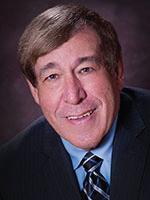
Liz Schafer of Tulane University received the Harold Riegelman/ Maurice Jacobs Award, presented to someone who has given outstand-
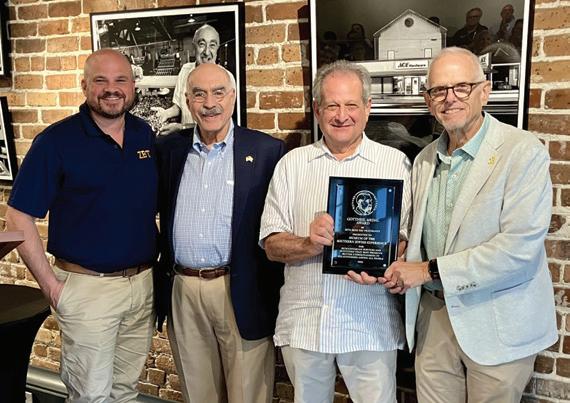
ing service to the interfraternity community. It is named for Riegelman, a 1914 Cornell graduate who was the first Jewish man to serve as president of the North American Interfraternity Conference. Jacobs, a 1917 Maine graduate, served as NIC president and received the Conference’s highest award, the Gold Medal.
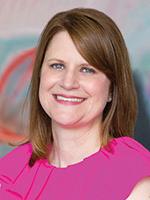
Schafer served as director of fraternity and sorority programs at Tulane for many years, assisting and encouraging ZBT’s Sigma Chapter and its brothers. She continues to support the Tulane community as senior development officer for major gifts. She previously worked in student affairs positions and earned a master’s degree at the University of New Orleans
Man of the Year was Harold Oseff, a Michigan alumnus who was international president from 2004 to 2006.
The Stephen Ehrlich Award, given to alumni who make significant contributions to the operations of the international fraternity, was presented to Harold Davidson of Los Angeles, a University of Southern California graduate.
The Heritage Award, presented to “a member of the Jewish community who distinguishes himself or herself in a communal, philanthropic, artistic, or professional endeavor,” was given to Irvin Chase, a UCLA alumnus, and Nancy Chase.
MSJE recognized
On July 31, the Museum of the Southern Jewish Experience received
the 2025 Richard J.H. Gottheil Medal, in a ceremony held at the New Orleans museum.
Named after the spiritual founder of ZBT, the Gottheil Medal recognizes “that individual or group that has advanced human understanding among all people.” Past recipients have included Eleanor Roosevelt, Doctors Without Borders, Special Olympics International, United Service Organization, Hillel International, Deborah Lipstadt, President of Ukraine Volodymyr Zelenskyy, and the U.S. Holocaust Memorial Museum.
In the 13 Southern states that MSJE represents, ZBT has chapters at 20 campuses, including Tulane, Vanderbilt, University of Florida, University of Alabama, University of North Carolina, Florida State, University of Texas and Virginia Tech.
The award ceremony was attended by ZBT International officers and alumni. Presenting the award to MSJE Chair Jay Tanenbaum and Vice Chair Morris Mintz, Barry Aarons, international president of ZBT, said “We are proud to recognize the amazing work the Museum of the Southern Jewish Experience has done in sharing the many unknown stories of Jews in the South, thereby bridging gaps between communities and expanding our larger American story.”
Tanenbaum said, “Receiving the Gottheil medal is a huge honor for MSJE and recognizes the impact we deliver in teaching how Jewish communities were integral in creating the American experience.” Tanenbaum then presented Aarons a commemorative MSJE mezuzah, and conveyed the Museum’s tagline, “Shalom. Make yourself at home.”
Earlier in the evening, more than 175 ZBT undergraduate delegates explored the Museum, getting a taste of Southern and Jewish history and culture.



As fall approaches, it is time to make plans for spring — and for 75 years, the Sisterhood at Birmingham’s Temple Emanu-El has been facilitating that with its annual Bulb Sale.
The Sisterhood, which is celebrating its 130th anniversary this year, started the fundraiser in 1950. Erin Arnold, chair of the bulb sale, explained that “bulb sales were a popular fundraiser back then for many congregations,” and Jasper’s Temple Emanu-El held such sales.
While the origins are uncertain, it is believed that Birmingham’s came from Memphis, when Betty Allenberg Goldstein moved to the city and brought the idea and expertise with her.

In the 1950s, Sisterhood members would go around, soliciting friends, neighbors and relatives. It was “more person to person,” Arnold said, and there would be followup calls and visits.
The bulbs would arrive in bulk, so Sisterhood members would volunteer and pack orders, then they would call people to let them know their orders were in. Often, Sisterhood would take an empty storefront and transform it into the Bulb Shop for several weeks.
Arnold said that by the time she joined in 2001, there was no storefront, but the Bulb Sale would take over Weil Hall at Emanu-El for several weeks, under the leadership of Loretta Newfield and Kim Roth. “It was pretty much the same way,” with paper orders and bulk shipments.
Now, Arnold said, the sale is online at the Sisterhood’s Flower Power platform, with word spread through social media, though the personal touch remains with members emailing friends who garden. Individual orders are shipped directly to the customers.
All this makes the sale “a lot more accessible,” Arnold said, and opens the sale to those outside the Birmingham area.
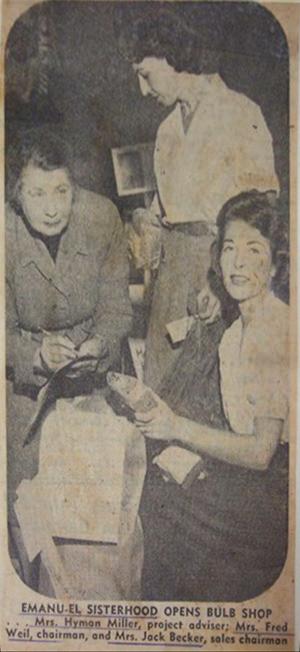
Many families who participated in the first sale 75 years ago are still well-represented at Emanu-El and take part in the annual event, making it an intergenerational event, she said.
shop in October 1957
In addition to being a fundraiser for Sisterhood, the Bulb Sale benefited services for the blind in Birmingham. Today, the funds go to support the joint Religious School hosted at Emanu-El, scholarships to the Henry S. Jacobs Camp, special projects at Emanu-El and social action projects. Half of the order amount goes to the Sisterhood.
In honor of the anniversary, the Sisterhood is trying to surpass its typical volume, and raise $7500. Available bulbs include a variety of tulips, daffodils, crocus, hyacinth, allium, irises, lilies and muscari. Herb kits are also available, along with some garden accessories.
Arnold also noted that the bulb sale is a way to bring some beauty to the community at a tumultuous time, showing resilience and hope as the bulbs bloom each year. She has some irises that she planted 17 years ago that come up every year — at least until the deer eat them.
For those without gardening skills, there are other ways to support the sale. Arnold said she routinely gets bulbs to donate to the Jefferson State community garden. She noted that pollinator gardens and community gardens are becoming more popular.
The fall bulb sale finishes on Oct. 15, and the holiday bulb sale begins on Oct. 18.
Arts at the Center includes wide range of classes
The New Orleans Jewish Community Center is expanding its arts offerings, with the launch of a new season of Arts at the Center, a “beginner-friendly creative arts program for adults,” according to program coordinator Joanna Russo.
The program includes several courses taught by local artists, for adults of all skill levels. Some classes are for ages 18 and up, others can go as young as 15.
The first course offerings were held in the spring, and during the summer the program included the Artist in Residence week with spray paint artist and muralist Brent Houzenga. “We plan for this sort of artist residency to be an annual occurrence, bringing in a different artist to work with our community each year,” Russo said.
During the residence week, and an additional workshop by popular demand, over 200 community members made art with Houzenga, and it is on display in the main hall of the Uptown JCC.
The program will include numerous offerings each fall and spring, Russo said, “for folks to have fun, learn new skills, and explore the creative arts in whatever discipline appeals to them.”
Registration costs vary by class, and there is a lower rate for JCC members. Participants can join classes that are already in progress at a prorated rate.
A 12-class series on stained glass, taught by Caryl Branch, started on Sept. 5, meeting from noon to 3 p.m. on Fridays through Nov. 21.
Russo is leading “How to Listen,” a three class course from 1:30 to 3 p.m. on Wednesdays, from Sept. 10 to Oct. 1. The class uses creative arts techniques, including music, guided meditation and storytelling, to deepen listening skills. Russo is a New York native who is a member of the Lincoln Center Theatre Directors Lab, and in New Orleans is co-artistic director for the nationally touring group Mondo Bizarro.
Russo will also lead a Scene Study acting class, meeting at 10 a.m. on Wednesdays from Oct. 15 to Dec. 10. The class will focus on techniques for entering a character’s imagined world, and honest engagement with scene partners.
Grace Blakeman is teaching Improv I and II, with Improv I on Mondays from 5:30 to 7:30 p.m., starting on Sept. 15, and Improv II on Wednesdays starting Sept. 17. Each course has eight classes. Blakeman began with improv at La Nuit Theater in New Orleans, and has per-
Among the recent stories on our new Substack:
A new scorecard ranks all 50 states on efforts to combat antisemitism
The American Jewish Historical Society acquired the entire works of Bill Aron, known here as the photographer for the “Southern Jewish Road Trips” exhibited at the Museum of the Southern Jewish Experience
Louisiana Sen. Kennedy grateful for snapback sanctions on Iran, says they must be enforced. The FBI arrested a man in Atlanta after a series of odd encounters at Jewish institutions
Florida man charged with arson attack on Jewish school, synagogue
Man linked to neo-Nazi groups pleads guilty to attempting to hurt Jews by destroying a Nashville energy facility
Louisiana judge rules Mahmoud Khalil, who led anti-Israel demonstrations at Columbia that sometimes turned violent, can be deported
Some Memphis rabbis say Trump’s deploying National Guard members to the city will help the crime problem

formed with Chicago’s Second City’s faculty team, Those Who Can’t, and was a founding company member of Under the Gun comedy theater. She was on multiple house teams at Second City Hollywood and was a main company member of ComedySportz Los Angeles.
Also starting on Sept. 15 will be Jazz Dance with Kenneth Kynt Bryan, meeting for eight Mondays at 7 p.m. Bryan is a long-time educator, a New Orleans international dance music recording artist, actor, dancer/ choreographer, model and performer. He is founder and artistic director of Flashmob New Orleans.
Sarah Ruth Altman will lead a Community Choir, meeting on Sundays from 2:30 to 4 p.m., from Sept. 28 to Nov. 30. A lifelong musician, she is the principal organist at Holy Name of Mary as well as a dedicated member of the Frazier Singers, New Orleans Vocal Arts Chorale, and Fourth Wave Women’s Choir.
Ash Gaude will lead a painting class, focusing on the fundamentals of acrylic painting, meeting Wednesdays at 5:30 p.m., starting on Oct. 8. A portrait painter and printmaker, Gaude has lived all over the U.S. and in the West Indies.
“Body Wisdom: Move Intelligently, Explore Creatively,” led by Natalie Cohen, will have five classes on Wednesdays at 6 p.m., from Oct. 22 to Nov. 19. The class is rooted in the principles of The Axis Syllabus, blending biomechanics with creative exploration. Cohen is a native New Yorker who serves through dance, teaching and environmental work.
There will be an exhibition on Dec. 4, featuring the stained glass and painting classes, and a performance by the community choir.
As part of the expansion of the arts at the JCC, an art opening and wine

Member-created art from this summer’s Artist in Residence week with spray paint artist and muralist Brent Houzenga was displayed at the Uptown JCC
tasting marking the dedication of the new member lounge at the Jewish Community Center’s Metairie location was scheduled for Sept. 18, with the bold new abstract works of featured artist (and fellow member) Tony Hollums.
Registration for all of the art classes is available on the JCC website.

The emergency room is open 24 hours a day, seven days a week — even if no one ever wants to go there. But if the time does come when you need emergency help, how do you know what is really an emergency and what can be resolved with a simple trip to an urgent care clinic?
Obvious physical trauma aside, it isn’t always easy to tell, so let’s start with what these facilities can (and can’t) do for you.
Both facilities might be open late, but the ailments they are designed to handle are very different. Urgent care clinics are there to fill in the gaps when you have an injury or non-life-threatening sickness after hours. These are things that you might see your primary care provider for during the daytime, such as minor aches and pains, flu symptoms or a sudden fever. They can even handle sprained limbs or stitch up small cuts.
If you suspect you have a broken arm or leg, though, you may want to head to the emergency room. Not only will an ER have X-ray, CT scan and other instruments that can diagnose your injury, trained technicians can read them on the spot. The main difference between an urgent care and an ER is a higher level of care. Emergency room physicians are trained to stabilize patients in life-threatening situations. Even if they can’t address the root cause right away, they can help get you out of the danger zone until a specialist arrives.
Accidents like car crashes that cause substantial bleeding or other physical trauma warrant an immediate trip to the ER. But some emergencies, such as strokes and heart attacks, may be harder to identify. The following are some warning signs of a stroke, and they can be especially worrying if you’re over 55 or have high blood pressure:
Loss of balance
Vision changes
Headache
Facial drooping or severe headache
Trouble speaking or confusion
Potential heart attack symptoms include:
Chest pain
Shortness of breath
Cold sweat
Fatigue
Pain or discomfort in shoulder, arm, back, neck, jaw or teeth
Heartburn
High fevers might not necessarily warrant a trip to the ER on their own, but if they are accompanied by a rash or persist for four to five days, that can be a cause for concern. In general, it’s best to know your risks. If you’re on blood thinners, for example, severe headaches can be a warning sign of hemorrhage if you’ve had a head injury.
These warning signs can be even less obvious for small children. The younger your kids are, the less they’re able to tell you what’s wrong. Prolonged fevers are even more of a worry for kids than they are with adults, so don’t hesitate to call your primary care provider after a couple days — and consider taking kids to the ER after four or five days.
Small bellyaches can happen, but extreme pain can mean something more serious like appendicitis. Sometimes, it’s a situation and not a symptom that can be a red flag. If you see a toddler near an empty bot-





tle of Tylenol, for example, call poison control or head to your nearest ER. Acetaminophen overdose can lead to liver damage or worse.
How you get to the hospital can be just as important as when you get there. For some sudden injuries, you can always have a loved one drive you to the ER if they’re on the scene. But if you’re having any of the warning signs of stroke or heart attack, play it safe and call 911.
Why? First responders won’t just get you medical help faster; they’ll make sure you get the right help. When it comes to a stroke, minutes count. EMTs can diagnose the problems on the spot and route you directly to a specialty care center if needed rather than going through the “middleman” of an ER.
When it comes to an emergency situation, Baptist Health is here. Learn more about ER options near you at BaptistHealthAL.com/ER
Skilled mahjong players will compete for a good cause and prizes on Oct. 16 as the Norma Livingston Ovarian Cancer Foundation hosts its first Racking for a Reason at the Vestavia Hills Civic Center.
Executive Director Ashley Thompson said “Mahjong has quickly become one of the most popular games in Birmingham. When considering creative ways to raise awareness about the often-silent symptoms of ovarian cancer, the Norma Livingston Ovarian Cancer Foundation Board of Directors thought, what better way than to combine the game so many love with an important cause?”
Because there is no early detection test for ovarian cancer, understanding the symptoms and knowing when to see your doctor can be lifesaving. “Our hope is that every time women sit down to play Mahjong, they will also think about their own health and well-being,” said Thompson. The event requires teams of four, so teams are encouraged to register at www.cureovariancancer.org and bring one Mahjong set and mat for their table. Racking for a Reason starts at 5:30 p.m., and will offer food from Café Iz, a silent auction and door prizes.
Thompson said proceeds from this event will benefit ovarian cancer research and support the Just a Need program, which provides assistance to patients in need. She also said they are looking for interested sponsors for the event (email ashley@nlovca.org).
NLOCF Board Member Susan Greene said her sister was diagnosed with ovarian cancer about 15 years ago.
“The work the Norma Livingston Ovarian Cancer Foundation does means so much to me because of the great advocacy, education and fundraising they do to find a cure for this deadly disease. I’m looking forward to Racking for a Reason and I hope to see everyone there,” she said.
Lori Livingston founded the nonprofit Norma Livingston Ovarian Cancer Foundation in Birmingham in January 2004 to honor her mother.
Norma Livingston was a healthy, active 65-year-old woman in the Jewish community who was rarely sick and very proactive about her health.
She went to the internist complaining of weight gain, abdominal discomfort and a chronic cough. When the diagnosis was finally made, Norma had stage four ovarian cancer. She endured nine hours of surgery and countless rounds of chemotherapy. Sadly, she lost her fight just more than a year later.
The mission of the NLOCF is to raise funds for ovarian cancer research; to increase awareness about the risks, symptoms and treatments of the disease, and to provide assistance to those undergoing treatment.
Doctors suspected Harmony Cooper had sickle cell disease when she was just days old. For first-time mother Briona Leonard, the prospect was both unnerving and intimidating.
“We were leaving the hospital a few days after her birth when doctors handed me a letter suggesting she get further testing at a specialty clinic,” Leonard said. “So we went and had all the blood work done to find out.”
When Harmony was 2 weeks old, the sickle cell diagnosis was official. Harmony was referred to Children’s of Alabama, home of the Alabama Center for Childhood Cancer and Blood Disorders, which provides care for more than 1,000 infants, children and adolescent patients with sickle cell disease throughout the state. Harmony was prescribed penicillin to manage the disease and began twice-a-month appointments with Children’s hematologist-oncologist Dr. Jeffrey Lebensburger for blood work and blood count monitoring.
“She was my first child, and at the time I really didn’t know what sickle cell was, so I was of course very upset. I had a lot to learn about what to expect and watch out for,” Leonard said.
“Children’s provided so much information that I needed to understand the disease. They took the care to make sure we had every question answered.”
It wasn’t long before Harmony began contracting viruses causing high fevers and reduced blood counts. The episodes, the first of which occurred when Harmony was 6 months old, resulted in hospitalization and blood transfusions.

“Each time, she had to stay at Children’s for about a week, and that first time I was worried about managing her medication while we were there, making sure she got it as needed and making sure it stays refrigerated like it had to be,” Leonard said. “The staff was so kind and managed it all for me so I didn’t have to worry. I really appreciated them removing that stress.”

In 2017, Harmony joined a clinical trial for sickle cell disease at Chil-






“Each time we are at Children’s, it’s such a positive experience because it’s always obvious that they care,” Leonard said. “They take such good care of her.”
By third grade, Harmony was a cheerleader and a tumbler. Her grandmother, Deborah Rice, said “Harmony began her first year of middle school on August 7. Having a successful fifth grade year, she walked away with several awards and honors, maintaining AB honor roll throughout her elementary years.”
Harmony has also been serving as a patient ambassador, representing Children’s of Alabama at Children’s Hospital Week hosted by Children’s Miracle Network in Orlando in April. The event was held at Walt Disney World Dolphin Hotel. Rice said CMN “went all out for the national and local champions. The event was filled with awards, entertainment, being able to see the dedication of CMN, the hospitals, partners; everything was just incredible. It was truly an honor to have Harmony selected as Local Champion for Children’s of Alabama.”
Courtesy Manning Family Children’s
Metairie native Daniel Cressy has never let his lifelong diagnosis of sickle cell disease define him. At just 22 years old, he has already set his sights high — quite literally. His dream is to become a commercial pilot.
That dream brought him to Manning Family Children’s where he is making history as the first patient in Louisiana to undergo gene therapy for sickle cell disease. The treatment marks not only a milestone for Daniel’s personal journey, but also a major advancement for the hospital and the patients it serves.
On July 30, Daniel arrived at Manning Family Children’s for the first step of his treatment. Tubes connected to his neck carefully cycled his blood through a machine, separating stem cells that will later be modified and returned to his body. The procedure, called apheresis, can be taxing, but Daniel faced it with determination. “It’s uncomfortable at first, but then you kind of get used it,” he said.
For Daniel, this moment represents more than a medical procedure. In 2022, his application for medical certification to fly was denied by the Federal Aviation Administration because of the risks sickle cell disease poses at high altitudes. Rather than giving up, he began exploring other ways forward — and gene therapy at Manning Family Children’s offered that path.
The hospital is the only location in Louisiana currently licensed to provide the two FDA-approved gene therapies for sickle cell disease. This makes it possible for local patients like Daniel to receive advanced care without leaving the state.
“Being able to offer these cutting-edge therapies here in New Orleans is a game-changer,” said Dr. Benjamin Watkins, director of the hospital’s Stem Cell Transplant and Cellular Therapy Program and division chief at Tulane Pediatrics Hematology and Oncology. “Daniel’s determination to pursue his dreams is inspiring, and we are proud to support him.”
The therapy itself is an 18-month long journey. After harvesting, Daniel’s stem cells will be shipped overseas to be re-engineered so they no longer cause the red blood cells to sickle. Once ready, those cells will be reinfused into his body at Manning Family Children’s, with the goals of providing a lasting cure. If successful, Daniel could be free from the paindren’s, and the trial medication, hydroxyurea, improved her overall health. She’s still taking it, and Leonard says it continues to help. Today, Harmony still visits the hospital to participate in two studies: the Cready study and the flax seed study. She also attends the ‘I Am Pretty Enough’ mentoring program at the Sickle Cell Foundation.
ful crises and complications he has endured throughout his life.
For Daniel, that means a chance to truly chase the skies. His inspiration came in part from a friend with sickle cell disease who completed a similar gene therapy trail and went on to earn a pilot’s license. That success story helped him believe in the possibilities — and strengthened his resolve to push forward.
On the day of his treatment, Daniel wore a T-shirt that read “Mr. Impossible,” a motto that reflects both his personal outlook and the spirit of innovation behind Manning Family Children’s work. “Becoming aviators with sickle cell was once something people thought was impossible,” he said. “Now I’m determined to prove it isn’t.”
As Louisiana’s only hospital able to administer these therapies, Man-
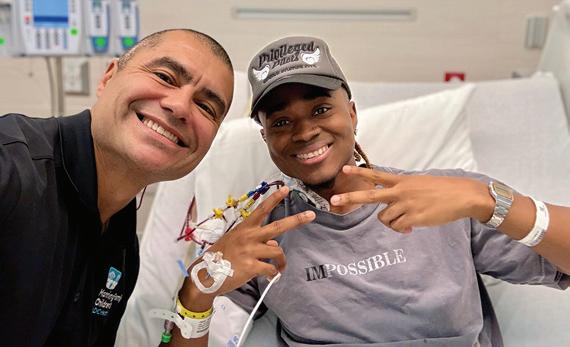
ning Family Children’s is committed to expanding access to life-changing treatment. Daniel’s story is just the beginning. By offering advanced gene therapies in-state, the hospital is ensuring that more patients with sickle cell diseases will have the opportunity to pursue their dreams — without being limited by their diagnosis.
For Daniel, the future is wide open. With every step of his treatment, he is not only moving closer to better health but also to the skies he has always longed to navigate. Manning Family Children’s is proud to be his partner on that journey.
The Parkinson’s community will come together on Oct. 11 at Lafreniere Park in Metairie for Louisiana Walks for Parkinson’s, benefiting the Parkinson’s Foundation and its mission to make life better for people living with Parkinson’s disease through improved care and advancing research toward a cure.
Registration opens at 9 a.m., and the walk itself, which is optional, begins at 11 a.m.
This year’s event will feature a silent auction, parade of prizes, live music, food and beverages (including beer and wine), and a kids’ corner, along with on-site resources for people with Parkinson’s and their care partners. Participants can also purchase Liquor Wagon and Parade of Prizes raffle tickets, with all proceeds fueling local programs and national research.
“Louisiana Walks for Parkinson’s is about community, hope, and action,” said Michelle Lane, event founder and Parkinson’s Foundation Ambassador. “Every dollar raised helps people live better with Parkinson’s today, while pushing research closer to tomorrow’s breakthroughs.”



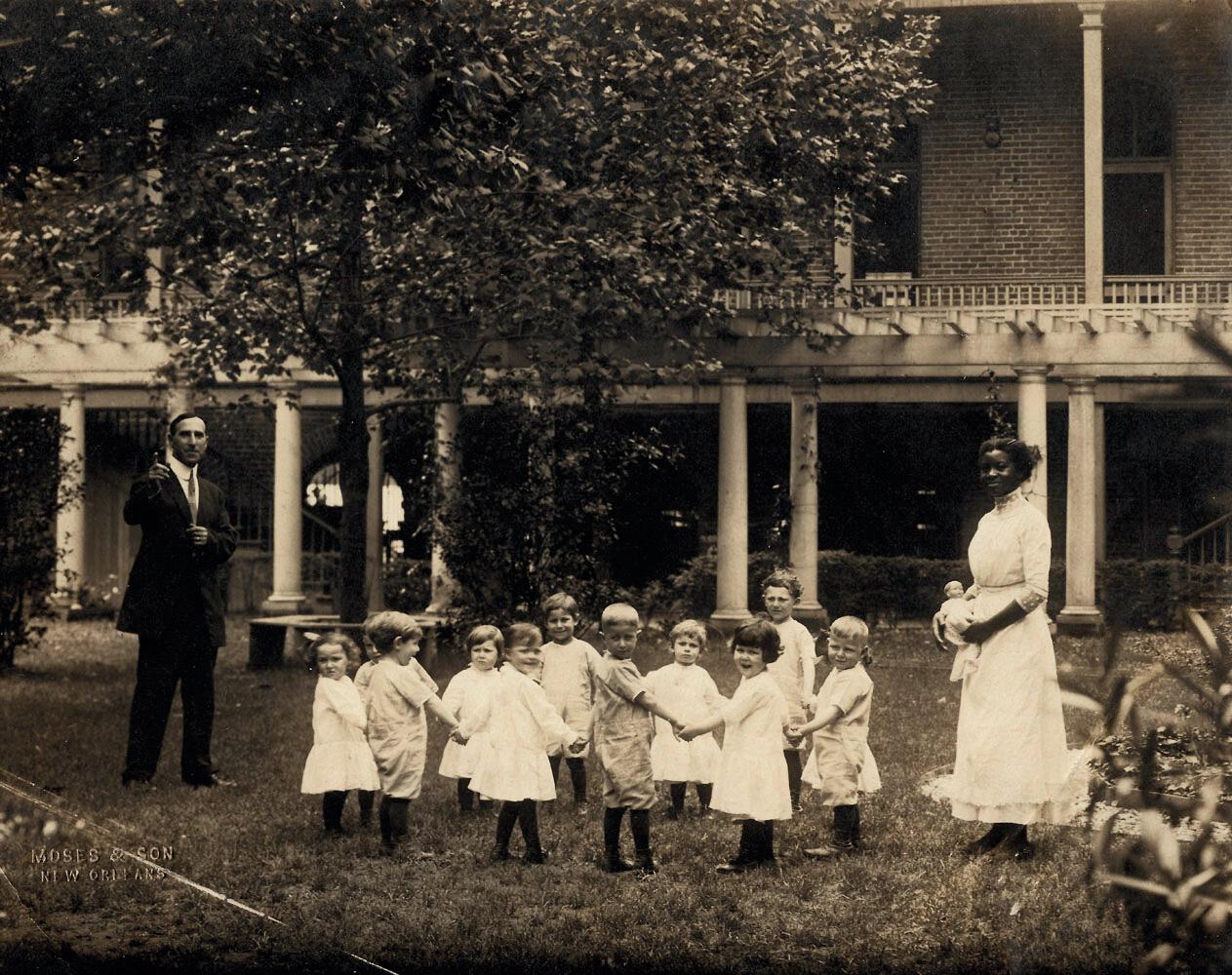






Jewish Family Service of Greater New Orleans has unveiled a new logo, and announced a step in furthering its goal of making mental health care accessible and affordable to all.
According to the agency, the new logo starts with bold lettering reflecting a strong foundation. The leaf is symbolic of growth, renewal and hope “we strive to bring to every client.”
The new logo “honors our history while embracing a vibrant future for JFS and our community.”

The agency also announced that it now accepts Humana Medicaid, Humana Medicare and BCBS Medicare (Blue Advantage). Jewish Family Service also accepts Aetna, United Healthcare, Blue Cross and Blue Shield, Blue Connect and Tricare.
For those without insurance or seeking more affordable options, JFS offers income-based payment on a sliding scale, ranging from $18 to $120 per session. Eligibility is based on household income and requires documentation such as pay stubs or tax returns.
For half a century, Birmingham’s Levite Jewish Community Center has been helping people exercise off Thanksgiving dinner before it begins.
Registration is open for the annual Sam Lapidus Montclair Run, held Thanksgiving morning on Montclair Road. Now in its 50th year, the Montclair Run began in 1976 and has grown into a local institution, with around 1,500 runners annually, raising money for the LJCC and the Alabama Center for Childhood Cancer and Blood Disorders.
Last year, 1,681 runners from 34 states raised more than $120,000.
The run was renamed in 2009, a year after Sam Lapidus died just days before his 15th birthday. He was a regular in organized sports and working out at the LJCC, despite his fight against Ewing sarcoma. The race has run every year, with a virtual run in 2020 due to the pandemic.
The main run consists of 5-kilometer and 10-kilometer options on a USATF certified course, starting at 8:30 a.m. on Nov. 27. There will be a one-mile Fun Run at 10 a.m. Packet pickup will be on Nov. 26 from 8 a.m. to 6 p.m., or starting at 7 a.m. on race day.
Registration is $36 for the 5K, $42 for the 10K and $18 for the Fun Run. There is also a “Friends of Sam” absentee registration. The registration for the 5K and 10K increase on Nov. 1.
The LJCC offers a “Couch to 5K” six-week training plan for beginners.
In addition to recognition of the top three finishers in each age group, there will be awards for best costumes.
The New Orleans Jewish Community Center is holding its third annual Try a Triathlon on Oct. 19, with a “Super Sprint” format of shorter distances. The change in format “offers a unique opportunity for participants to dive into the world of triathlons without the intimidation of longer courses.”
Participants will swim 425 yards, one-fourth of a mile, followed by a 2.2 mile run and a 6.2 mile bike ride.
The event will be at 8:30 a.m. Uptown, and registration is $40 for members, $60 for non-members.
The New Orleans Jewish Community Center will celebrate Jewish pop stars of the 1970s and 1980s at its annual Center Celebration, “Make it Pop!,” Nov. 8 at 7 p.m.
The musical variety tribute will be performed by Cha Wa’s Grammy-nominated Joe Gelini and Alix Paige. Attire or costumes from the 1970s and 1980s are encouraged, otherwise it is dressy casual.

The signature fundraising event supports diverse programs and events at the JCC, including Early Childhood, summer day camps, older adults and those affected by Alzheimer’s, and community cultural events.
“Still the One” tickets are $150. There is a “disco discount” of $75 for current Early Childhood families, limit of two per household.
“Two Tickets to Paradise” is $300, and sponsor levels begin at $500 with Copper-“cabana,” continuing for several levels to the “Neil” Diamond sponsor at $15,000.
At what would have been Charles Wampold’s 100th birthday, the Montgomery Museum of Fine Art is displaying “Collecting Modern American Art: The Charles and Babette Wampold Collection,” from Oct. 10 to Jan. 11.
The Wampolds collected modern American paintings for almost four decades, donating most of them to the museum between 1982 and 2018. They would make frequent self-described “pilgrimages” to New York City to add to their collection.
The exhibit reassembles their gifts into one exhibition, paying tribute to gifts that enhance the museum’s representation of early and mid-20th century American art.
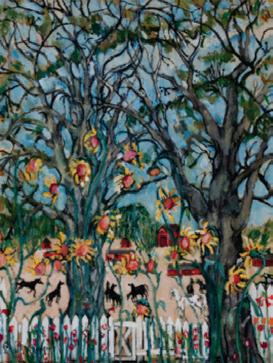
“Happiness Farm,” 1946, oil on canvas, Gift of Babette L. Wampold in memory of Charles H. Wampold.



The CBS affiliate asked him about usage of that word, and he admitted that it is “a very strong word” to use, but when he sees the group, “I’m not seeing a Jewish person. I’m seeing someone who is walking down the street talking about 20 hostages and ignoring the 2 million Palestinian hostages that are being kept in Gaza.”
Either Stone never got the memo, or he is desperately in need of a clue. No doubt he is saying that Israel has trapped the 2 million Palestinians in Gaza, for whatever nefarious ends, or why else would he complain about someone focusing on Israeli hostages instead?
One could not have the situation more backward.
1629 Oxmoor Road • Homewood, AL (205) 871-7837 • applausedancewear.net
Dancewear, Gymnastics and Fitness
Family Owned and Operated since 1981

In pretty much every war around the world, refugees are generated. Syrians, Ukrainians, Sudanese, whoever, try to flee the conflict and are gathered in neighboring countries, where they can be out of harm’s way and tended to by the international community, until the situation is resolved. It happens in every conflict. Except one.
When the war began, Israel said that it would make life easier for Israel and for the Gazans if Gaza civilians could be temporarily relocated, so Israel could go after and get rid of Hamas. That was immediately and forcefully rejected by the world. The Gazans had to stay put and suffer.
For Hamas, it is because their plan all along was to use the Gazans as human shields. Hamas had their fortified underground bunkers where they could hide and move around. Having civilians above the tunnels — and, mind you, those same civilians were forbidden from taking shelter in those tunnels and there were no other infrastructure provisions to protect them — would either protect the Hamas fighters, or if Israel attacked anyway, open up a huge can of condemnation against Israel for “targeting civilians” when going after the tunnel networks that had been built under the cities.
For Hamas, a high civilian death toll was a positive goal, as they’re interested only in establishing the religious caliphate, and martyrdom toward that end is a blessing — and it gets the world riled up against Israel.
For Egypt, which has plenty of negative experience with the Muslim Brotherhood, the parent organization of Hamas, the goal was to hope the world forgot that Gaza also has a border with them (through which a lot of smuggling took place). Let Israel take all the blame — even though Egypt reinforced its border wall to a degree far more severe than any security barrier Israel has ever built.
Israel’s suggestion for a humanitarian zone in northern Sinai near Gaza and the Israeli border was met with a frosty reception.
continued from page 5
After Oct. 7, Egypt warned Israel that if a single Gazan wound up on Egyptian territory, they would tear up the 1979 peace treaty. Except, of course, for the Gazans who could scrape together $6,000 to $10,000 each to be smuggled out of Gaza into Egypt, with the typical bribe to Egyptian authorities, and then go somewhere else.
As for the rest of the world? The anti-Israel folks who have convinced so many that Israel is a colonizing, genocidal expansionist foreign incursion into the Middle East found a willing audience to believe that they only reason Israel was suggesting a relocation of Gazans was to perpetrate Nakba II — ethnically cleansing the Strip and taking over prime beachfront property. Move Gazans out of the Strip “temporarily”? What a horrific idea! It was seen as preferable to let the Gazans remain there out of principle. It was only Israel and the United States — at least once Trump was back in office — that wanted to get the Gazans out of harm’s way. As we have stated repeatedly, it is Israel and the pro-Israel community that cares the most for the well-being and future of actual Palestinian people.
So maybe Stone was thinking of the world’s actions when he referenced 2 million being held in Gaza. But considering that he used the term Nazi to describe a woman who is simply marching in solidarity with Israelis held hostage in Gaza, that probably wasn’t the statement he was making.
It’s Israel’s fault. Always is, especially when it isn’t.
Making the entire situation even more eye-rolling, there was a GoFundMe to “divest Boulder from genocide,” to support the city council campaigns of Stone and Rob Smoke. “They are running on a Stop the Genocide in Gaza campaign,” the page says, before mentioning that there is a $200 maximum donation — and “the city will match funds.”
Great.
Both are described as “single issue candidates,” and that issue has nothing to do with Boulder. Stone has shown himself to be just another clueless member of a long list of useless idiots hijacking causes, campuses, organizations and even governmental entities to shill for genocidal jihadists who want to wage war against Western society (much like their “progressive” comrades), once they get Israel out of the way.
But don’t fret, there’ll soon be someone else with an even more jaw-dropping take on Gaza.

By Lee J. Green
The Alabama Shakespeare Festival’s 2025 to 26 season puts a spotlight on the Lehman family from Montgomery; prolific Jewish singer/songwriter Carole King and the world premiere of a show by a Jewish playwright about the Reconstruction era in the South.
“One of the major tasks for an artistic director is programming,” said ASF Artistic Director Quin Gresham, who started in November 2024 and did a lot of outreach in the Montgomery community when planning his first season at the helm. “I wanted to make sure our work is reflective of the community we’re in and what our ASF faithful seek. The goal of programming is to bring in shows that tell important stories and ones that will engage the community.”
“The Lehman Trilogy,” running Jan. 29 through Feb. 15, 2026, by Stefano Massini, traces the rise and fall of an immigrant family in Montgomery. The Lehman Brothers financial institution started as a dry goods store opened by German Jewish immigrant Henry Lehman in 1850. He would later be joined by his brothers, Mayer and Emanuel, to form Lehman Brothers. The firm grew by accepting cotton as payment and, after the brothers moved to New York, they helped establish the New York Cotton Exchange in 1870.
By the turn of the century, the firm transitioned into investment banking and grew to be among the world leaders in finance. Then due to the housing bubble bursting in 2008, Lehman Brothers filed for the largest bankruptcy in history.
“It’s an important Jewish immigrant and Southern American dream story that later becomes a cautionary tale and capitalist tragedy,” said Gresham. “’The Lehman Trilogy’ explores ambition, identity and the price of unchecked success.”
Opening July 16 of next year, “Beautiful: The Carole King Musical” tells the story of the world-renowned singer-songwriter. Before she became Carole King she was Carole Klein, a Brooklyn girl with a piano, a dream and a sound all her own.
King would write chart-topping songs for music’s biggest stars and would later top the charts in the 1970s and 80s, singing songs she would write for herself.
“This is a musical with some of the most iconic music of our time,” said Gresham. “It’s a success story about a Jewish artist and her relationship with her mother, her family and her core identity.”
The ASF will also present the world premiere of a play by Jewish playwright Robert Schenkkan about the unbelievable true story of Mississippi’s first Black speaker of the House.
“ReCON$truXion,” which will be featured from April 23 to May 3, 2026, tells the story of John Lynch, a man born into slavery who challenges the broken promises of Reconstruction. He would later rise to become a United States congressman and achieve great political success nationally.
The ASF commissioned the Pulitzer Prize and Tony Award-winning playwright (“All the Way,” “The Kentucky Cycle”) to present the story of an inspiring writer, attorney, military officer and politician who embodies the strengths as well as the struggles of a rapidly changing America.
“Most students aren’t taught in much detail about the Reconstruction era and some of the newly freed individuals who earned leadership roles then had to fight to overcome corrupt Jim Crow laws,” said Gresham. “It’s really an extraordinary story about courage and fighting for rights.”
The 2025-26 ASF season launches with Agatha Christie’s “Murder on the Orient Express,” Oct. 2 to 26. Gresham will direct that show and the following show, “Disney’s Frozen The Broadway Musical,” Nov. 26




through Jan. 4, 2026.
The season also includes “Unforgettable: John-Mark McGaha Sings Nat King Cole,” Feb. 12 to 15, 2026; “Much Ado About Nothing” by William Shakespeare, March 19 to April 5, 2026; as well as “Chicken & Biscuits,” June 4 to 21, 2026.
Gresham came to ASF after serving for 20 years as producing artistic director of the Arrow Rock Lyceum, the second-oldest professional theatre in Missouri. Before that, he had a successful career acting in and directing shows in New York after graduating from Webster University in St. Louis.
“When I was growing up, we’d visit my uncle in Alabama every summer and I have some fond memories of our adventures,” he said. “I learned of the incredible reputation of the Alabama Shakespeare Festival while in college. And my partner, Emily, stage-managed a few shows here in recent years, including “The Wizard of Oz” last year, so we really came to experience the great art being produced here in Montgomery.”
Gresham said he is a “Southern boy who loves Southern storytelling and I appreciate how important theatre education is to the enrichment of young minds.” He said the ASF goes into schools in the Montgomery area to work with kids on a truncated form of one of Shakespeare’s plays every year.
“We want the work we do to be for everyone and for the shows to encompass a wide array of audiences,” he said. “You can come to the ASF wearing shorts or a shirt and tie. “
continued from page 11
question and answer session with Executive Producer Leonard Gold, former Jewish Federation of Greater New Orleans CEO Arnie Fielkow, and Blake Ziegler, a student who is featured in the film. The screening is co-sponsored by the Federation, ADL South Central and Jewish Community Day School. Registration is required.
(acclaim)
“He periodically spells my name right.” – Moses
“Yes, we gave him a graduate degree. We’re looking into it.” – chancellor, Jewish Theological Seminary
“Half of the things he says I said, I never said. Including this.” – his mother
“He knows more about Judaica than most, and you won’t find any of it in this book.” – his fourth-grade teacher
“I’ll deal with him.” – The Almighty Big G



Sherron Goldstein will lead Jewish Cooking with Sherron, a oneday event, at Birmingham’s Temple Emanu-El, Nov. 2 at 9:30 a.m.
The Temple Beth Or Sisterhood in Montgomery is holding its annual Carnegie Deli sale, but this time it’s much more than cheesecake. There are traditional cheesecakes, 4-inch for $20 and 6-inch for $30, and chocolate covered cheesecake bites in regular, raspberry or chocolate, for $15. In addition, one can order 1.5 pounds of pastrami or corned beef for $35, and black and white or rye chocolate chip cookies for $5. The order form is on the Beth Or website, and pickup will be on Nov. 18 or 19, from 9 a.m. to 5 p.m.
Birmingham’s Temple Emanu-El Sisterhood will have a Sharsheret Pink Shabbat Service of Healing, Oct. 24 at 6 p.m.
The next Torah on Tap with Rabbi Steven Henkin of Birmingham’s Temple Beth-El will be on Nov. 5 at 7 p.m., at Mayawell. The evening is co-sponsored by You Belong in Birmingham. The first round is complimentary.
The New Orleans Jewish Community Center Uptown will host the Common Ground Speaker Series, “Economic Growth Incentives or Taxpayer Funded Patronage?” on Oct. 22 at 6 p.m. The panel includes Daniel Erspamer, CEO of the Pelican Institute; Micheal Hecht, president and CEO of Greater New Orleans Inc.; and Stacey Roussel, deputy director of Invest in Louisiana. Nathalie Simon, director of governmental affairs at Laitram, will moderate. The event is co-sponsored by WWLTV, nola.com and the Neutral Ground.
Jewish Children’s Regional Service in New Orleans announced that this year’s Latkes with a Twist events will be on Dec. 4 at Kenny and Ziggy’s in Houston, and on Dec. 7 in New Orleans, featuring Chef Susan Spicer and Rosedale.
Birmingham’s Temple Beth-El will welcome composer and educator Rena Branson as musician in residence, Oct. 12 to 14. She will lead a workshop on song circle skills on Oct. 12 at 3 p.m., fol-lowed by mincha and a healing song circle at 5:30 p.m. On Oct 13, there will be a 5:30 p.m. Simchat Torah for Tots, led by Robin Berger, followed by a 6 p.m. dinner and 6:45 p.m. Simchat Torah celebration with Branson. On Oct. 14, Branson will lead Hallel, hakafot and musaf during the 9:30 a.m. Simchat Torah service.
Birmingham’s Collat Jewish Family Services will have a community volunteer opportunity on Oct. 28 at 9 a.m., assembling food boxes at the Community Food Bank of Central Alabama in Homewood.
Temple Sinai in New Orleans will have a brunch honoring its past presidents, followed by a silent film ensemble spectacular, screening “East and West” with world renowned musicians Donald Sosin and Alicia Svigals performing original music. The film, from 1923, features Molly Picon as a young New Yorker who goes to a family wedding in Europe and gets into mischief with yeshiva students. The screening will be on Oct. 26 at 12:15 p.m., following the 11 a.m. brunch. The brunch will be organized by Rommel’s Catering.
Bais Ariel Chabad in Birmingham and Collat Jewish Family Services are launching Chai Connections, a monthly luncheon for Jewish adults age 65 and up. The debut will be on Nov. 3 at noon at Chabad. Jamie Odrezin will present “The Value of Jewish Community.” Suggested donation is $5, and reservations are requested by Oct. 26.
Beth Israel in Jackson will have a Mah Jongg tournament, Oct. 19 from 2 to 5 p.m. Entry is $20 by Oct. 16, snacks and drinks, including wine, will be served, and prizes will be awarded.
NFTY-Southern will have its Fall Conclave in Pensacola the weekend of Oct. 24.
Rabbi Adam Wright of Birmingham’s Temple Emanu-El will be teaching a two-part class, “Never Again Happened,” which juxtaposes the Holocaust and Oct. 7. The classes will be on Oct. 24 and Nov. 14 at 5 p.m. at Emanu-El. He will explore the ideological foundations of National Socialism and Hamas, showing the parallels in their hatred, radicalization and intent to eradicate the Jewish people. The comparison will be explored for its contemporary lessons of moral and historical responsibilities of memory, and confronting the phrase “Never Again” in the context of renewed violence.
Hadassah New Orleans will have a joint program with Beth Israel in Metairie, a discussion and Shabbat dinner with author Motti Imbari about his book, “Ruth Blau: A Life of Paradox and Purpose,” on Oct. 24. Details will be announced.
The Uptown Jewish Community Center in New Orleans will have its annual Books and Bagels, Oct. 26 from 9 a.m. to 1 p.m. The community-wide gathering features gently used books donated by members and friends, with all proceeds supporting JCC programming. Donation drop-off days at the Uptown JCC are Oct. 22 and 24.
JNOLA, the Next Gen group at the Jewish Federation of Greater New Orleans, is holding a Judaica in the Home art workshop series. The three-part series begins on Oct. 12 at 1 p.m., partnering with CYJN to create marbled colored challah covers. On Nov. 13 at 6 p.m., the event with Tribe will be about painting Shabbat candles. The final session, Dec. 3 at 6 p.m. with Temple Sinai, will be creating mezuzah covers. Locations given upon registration, which is $18 per session or $45 for all three workshops.
Jewish Community Day School in Metairie will have its fall Open House on Oct. 19 at 3:30 p.m.





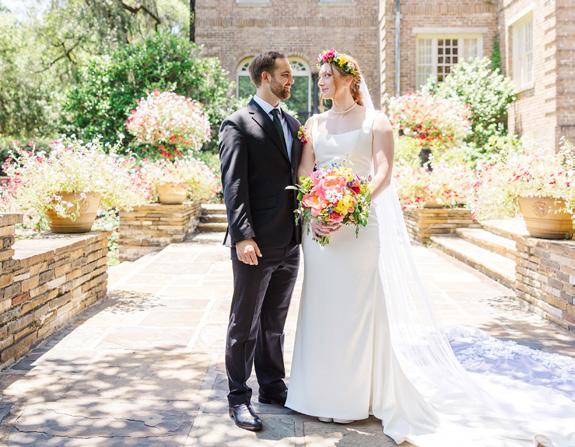
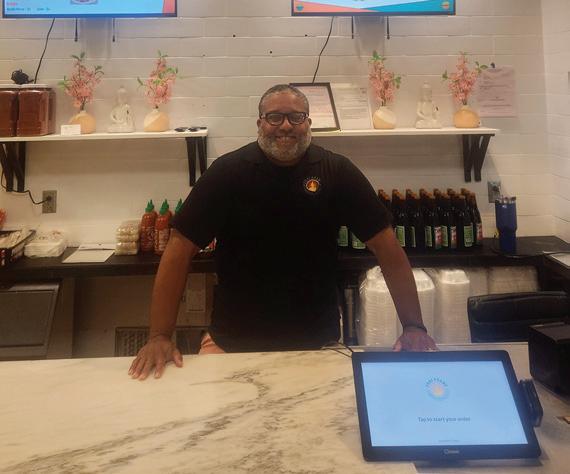
Pizitz Food Hall 1821 2nd Ave. No. Birmingham
(6–8 servings)
Ingredients
3 (13½-ounce) cans Chaokoh brand unsweetened coconut milk
1½ to 2 cups water

3 to 4 tablespoons Mae Ploy brand Panaeng curry paste
3 tablespoons Jif brand creamy peanut butter
2 tablespoons sugar or palm sugar
1 tablespoon vegetable bouillon powder (optional) or two vegetable bouillon cubes
1 tablespoon soy sauce or tamari (kosher), instead of fish sauce
½ teaspoon MSG (optional)
Vegetables: 2 cups chopped napa cabbage, 1 cup small broccoli florets, and 2 medium carrots sliced into thin rounds
Method
1. In a medium pot, combine the Chaokoh coconut milk and 1½ cups water. Bring to a gentle simmer.
2. Stir in the Mae Ploy curry paste, sugar, optional bouillon powder, soy sauce and MSG until dissolved. Let the sauce simmer for 10–15 minutes.
3. Add the Jif peanut butter and whisk until the curry is smooth.
4. Taste and adjust the seasoning. Add more water if you prefer a thinner curry; adjust sweetness or saltiness as needed.
5. Add the napa cabbage, broccoli florets and carrot slices. Cook for 3–5 minutes, or until the vegetables are tender but still crisp.

By Lee J. Green

With many years of experience in Asian restaurant management, Jeran Williams knew opening an authentic Thai restaurant in the historic Pizitz Building would be a big win.
After serving for a few years as the director of operations for the Nashville-based Thai Esane and helping open up the Birmingham location in March 2024, Williams purchased the location this past July.
“Birmingham is a very sophisticated food city and we wanted to reflect that with Thai Esane,” said Williams. “These are all authentic family recipes and we put all of our focus on making sure it is a high-quality experience every time.”
Williams grew up in Murfreesboro, Tenn., and started working in Asian restaurants during high school and in his time at the University
continued from page 46
are the Hebraic “ch,” so no natives pronounced her name correctly. Thus, it’s largely unrealized today that Hawaii’s largest city was originally named in honor of young Chana Lulu.
On the Saturday night immediately following her bat mitzvah, the family had a post-Havdalah cookout on the beach. Chana’s uncle Lou suffered a medical episode and her family desperately sought help.
Fortunately, a few native Hawaiians were nearby. Unfortunately, they spoke only Hawaiian. The family failed to convey the emergency, and soon resorted to simple words and gestures. They pointed back to the fire pit, said the man’s name, and tried to express great pain.
The natives rightly perceived this as pointing to the cookout and saying “Lou! Ow!” Thus, to this day, a Hawaiian cookout is called a luau.
Doug Brook is still mostly in Maui after his first trip there in July. To acquire both Rear Pew Mirror books, read other past columns, or listen to the Rear Pew Mirror podcast, visit http://rearpewmirror.com/
of Tennessee.
Years later he met Nina Siweto, who had a family business in Nashville. It was part food store and part jewelry store. In 2014, she opened Thai Esane and today they have locations in Nashville as well as Chattanooga.
Williams said Thai Esane’s menu includes some more-well-known Thai favorites including Pad Thai, Pad See Ew, Drunken Noodles and Panaeng Curry.
But he said they want to continue to innovate to bring the Magic City eclectic dishes and ones they might not be as familiar with.
Williams has ideas for fusion cuisine. “We recently launched our brisket fried rice and we’re looking at the possibility of doing some seasonal dishes, curries to go beyond what people might expect from a Thai restaurant.”
Some of the menu items are made with an oyster-based house sauce, but they are happy to customize any order to make it kosher-style.
Thai Esane also plans to expand its catering and family meal pick-up business at its Birmingham location. The catering menu includes pans of egg rolls, Bangkok wings, Thai-style lo mein, and red curry, among other items on the current restaurant menu.
Williams’ father opened some barbecue as well as meat-and-three restaurants after retiring from 22 years of service in the U.S. Army.
“Food has always been an important part of our family traditions,” he said. “I don’t want it to be just a meal, I want to be an experience.”



Bridget Sikora CRP, GMS
& Poynor Properties


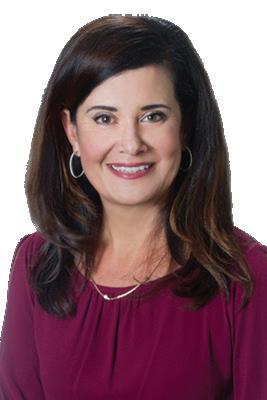

“Gary became part of the family. When my husband and I first decided that we would put our toe in the real estate waters, I knew the only person I wanted to represent us was Gary. He’s a real gem!” — ST, Metairie
“As first time home buyers, my wife and I were very unfamiliar with the process of purchasing a home. From the moment we met Gary to the day we closed he was great about answering all our questions, walking us through the process and being an advocate for us. I recommend Gary to anyone in the New Orleans area looking to purchase a home.”
— DH, New Orleans

Gary Lazarus
Buyer/Seller Representation
Investing & Consulting
Cell: 504.382.2603
Office: 504.866.7733
gary@garylazarus.com www.garylazarus.com

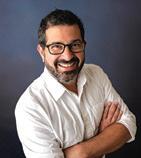

Anyone who’s Jewish from The South and has traveled to any state that lacks a Buc-ee’s has experience fielding the question, “wait, there are Jews there?”
This experience is shared by anyone who’s Jewish and from the actual southernmost part of the United States: the Chaiwaiian Islands.
It’s true. The nation’s sole islandic (not Icelandic) state, where nobody books ‘em like Danno, is home to several thousand Jews — not even counting tourists and timeshare owners.
How did they get there? Well, they didn’t drive. But their origin story is as interesting as the rest of this column.
It goes back countless generations, when the first people to step foot on the Hawaiian Islands received a warm welcome from the local Chabad House.
Even earlier, as has been widely speculated later in this sentence, some believe that Hawaii is the final resting place of Noah’s Ark.
This would make Hawaii the site where Noah and the Almighty Big G made their covenant, colorfully agreeing that never again would the Almighty Big G compel Noah to clean up after that many animals. This explains why, to this day, Hawaii is known as the Rainbow State.


8001 Maple St | New Orleans, LA 70118 Each Office Independently Owned and Operated

Slightly more recently, after their exodus from Egypt, the Israelites wandered for 40 years and 40 nights. This is despite the Sinai desert being small enough that even a synagogue board couldn’t take 40 years to lead people across it.
Perhaps they took an unrecounted scenic route, and nothing is more scenic than Hawaii. Need proof? The Torah says that the Israelites in the wilderness ate manna which, according to tradition, had little appeal or flavor itself until one’s imagination or creativity entered the equation. This also happens to describe poi.
Our 50th state has a long Jewish history
Jumping to relatively modern history, the relatively official history of Jews in the fiftieth state begins relatively close to two hundred years ago. Exact dates are hard to nail down, though there’s conclusive evidence that Jews were present before the early 1900s.
At the end of “Fiddler on the Roof,” around 1905, all the Jews of Anatevka are given just three days to invent Travelocity and book one-way travel.
Tevye says that they’ll be staying with Uncle Avram, who it’s previously said lives in America, but it’s not stated where. It’s hinted, however, much earlier in the show, as Tevye sings about a happy future, “to life, to life, Hawaii…”
So, Jewishly speaking, why is this state different from all other states? Because, on all other states, the small but mighty Hawaiian Jewish community has had an immutable impact.
For example, it’s well-known that synagogues cannot live on clergy and staff alone. Nowhere is this truer than in a state that’s a four-hour flight from any other, making the presence of a rabbi as scarce there as a New York bagel.
So, of necessity, the Hawaiian Jewish community created something uniquely Hawaiian that nevertheless became the lifeblood of synagogues nationwide for the past hundred years: lei leadership.
No additional evidence is needed, but there are a couple hundred more words to fill so here’s another example.
The first bat mitzvah anywhere in the world was a young Hawaiian girl. The native Hawaiian alphabet has only 13 letters, none of which









